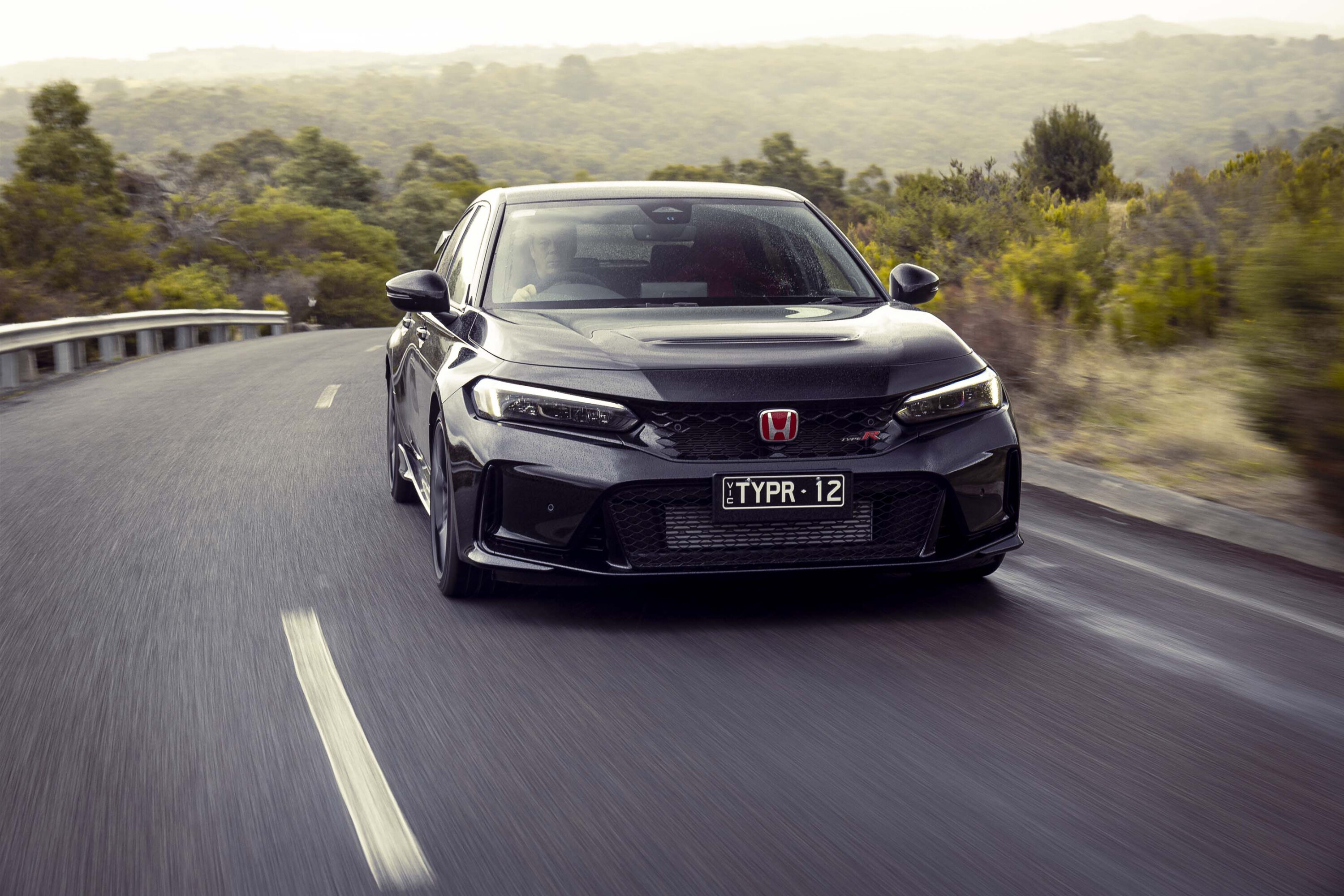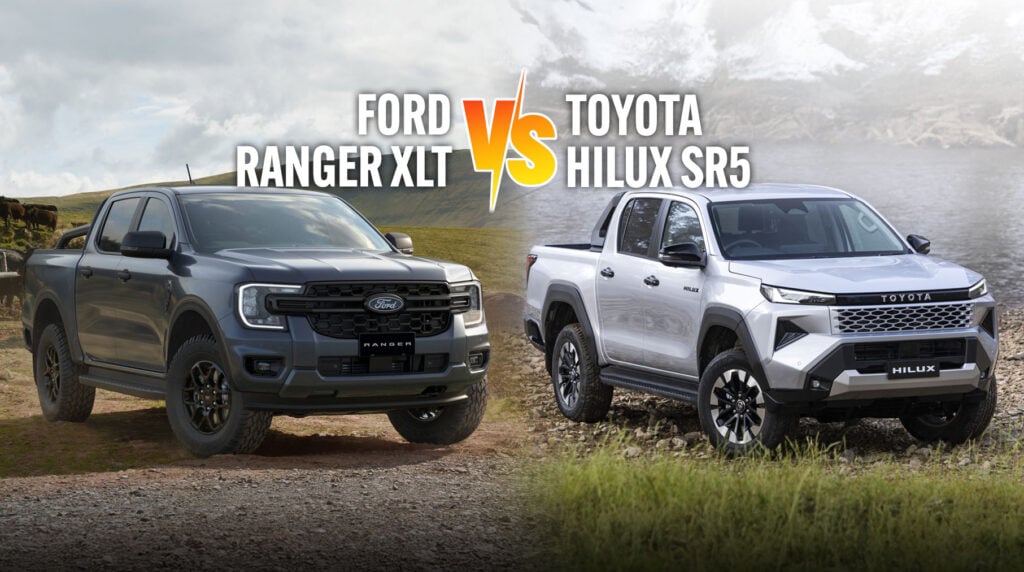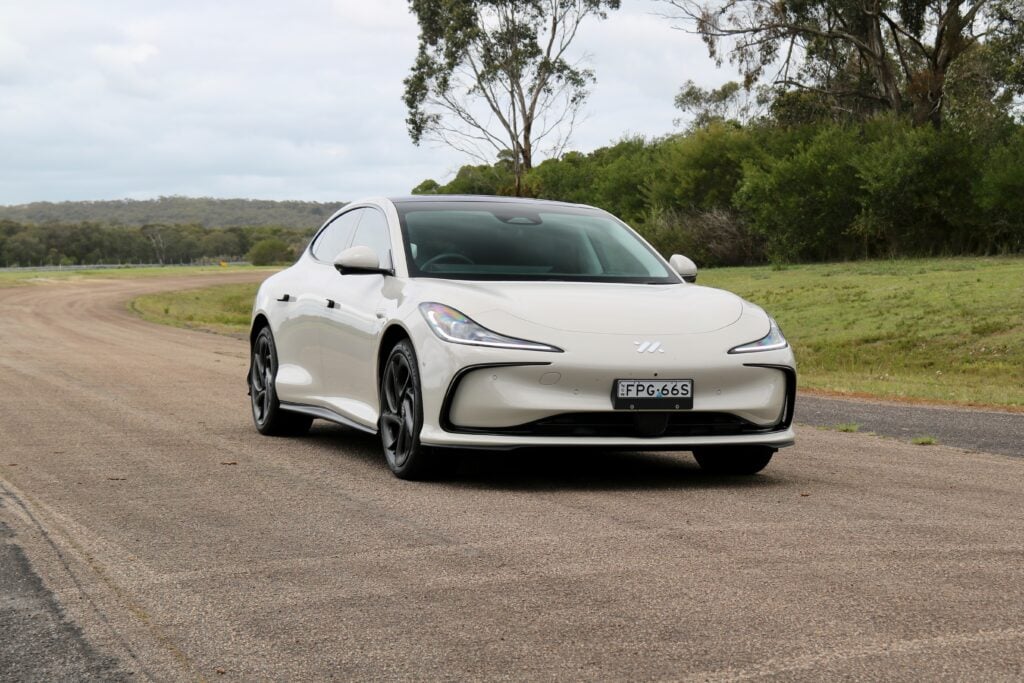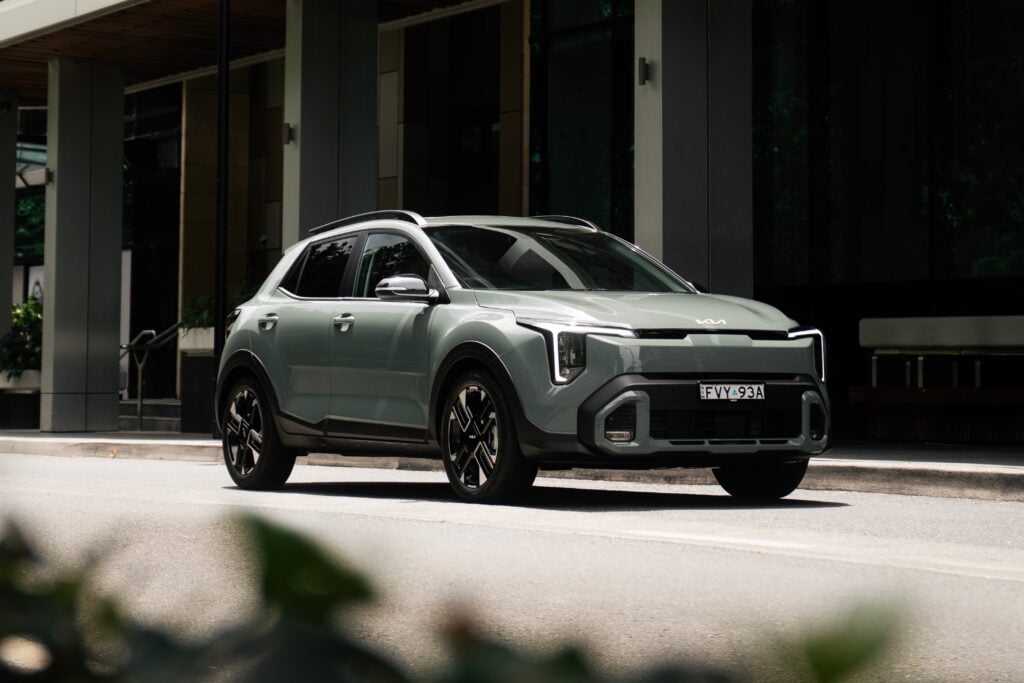Score breakdown
Things we like
- Truly brilliant to drive
- Trounces its rivals for polish, cohesion and driver involvement
- Sensational manual gear shift (“don’t say ‘rifle bolt action’, don’t say ‘rifle bolt action’…”)
- Superbly comfortable red bucket seats
Not so much
- Price hike means it’s now pretty expensive
- You can’t get one; wait times are two years
- Back seat lacks air vents, USB-ports and other equipment
The Honda engineer pauses, as if carefully considering his next words. “As you can see,” he says with a flourish of his hand towards the 2023 Civic Type R, “this new car is much less … polarising … to look at.” Fair to say he’s undersold that one.
Honda’s old FK8 Civic Type R was sublime to drive – truly, it’s so good that it’s not a stretch to call it the Porsche 911 GT3 of the hot hatch world – but it also looked a touch… over the top. In fact, its overwrought riot of wings, flics and fake vents were reason enough for many hot hatch fans to give it a miss.
But this new model… gosh. Parked up in the gloomy basement of Honda Australia’s HQ it’s not only immediately less juvenile but it oozes presence and stance, even on smaller 19-inch wheels. The arches are swollen, there are flashes of red on the badges, brakes and seats and, as you might expect, demand is at fever pitch.
Unless you were eager enough to place an order 12 months ago, the wait time for the new Type R now sits at two years. Let us put that another way. If you were to order one today, your car won’t arrive until 2025. At the earliest.
So is this sleeker, quicker, and more expensive Type R worth waiting for? And can it possibly live up to the hype? Our expectations couldn’t be higher…
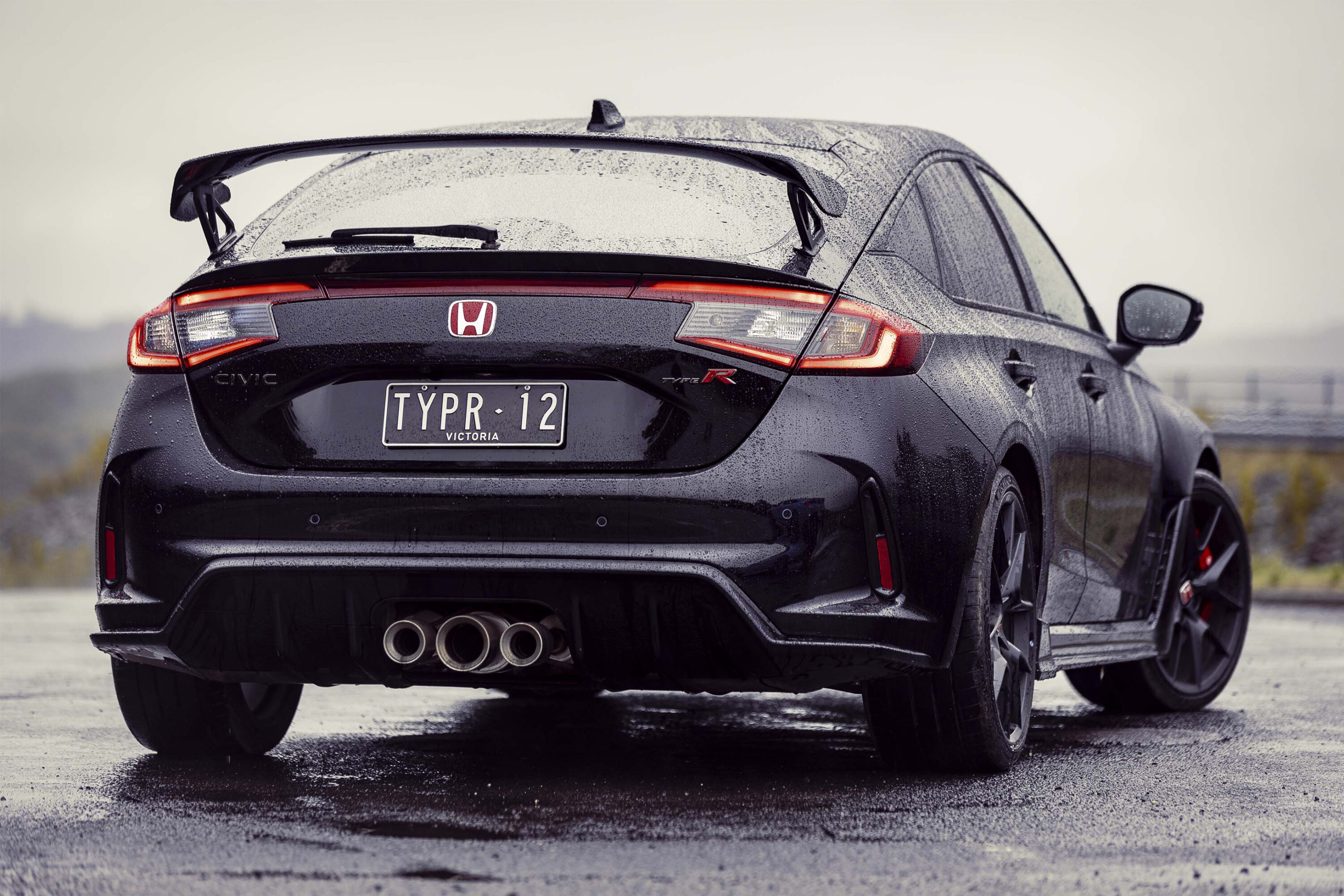
JUMP AHEAD
- How much is it, and what do you get?
- How do rivals compare on value?
- Interior comfort, space and storage
- What is it like to drive?
- How much fuel does it use?
- How safe is it?
- Warranty and running costs
- VERDICT
- Specifications
How much it is, and what do you get?
We’ll get to the price and equipment details in a second but first up, let’s address the question of hype. Yes, this new Type R is just as good as you want it to be. In fact, it might actually be better. Underneath, the FL5 Type R rides on the same fresh platform as the 11th-generation Civic but many of the other fundamentals carry over from the old Type R.
The 2.0-litre turbo engine bears the same product code (K20C1 for the geeks out there), the six-speed gearbox is the same, the suspension layout, with its ‘Dual Axis’ strut set-up is, you guessed it, the same, and the Type R still channels all of its 235kW/420Nm through the front axle alone. If that recipe sounds a touch old school, well, that’s because it is.
No all-paw traction, twin-clutch differential packs or fancy drift modes to contend with here. Honda has instead honed a tried-and-proven recipe and the results are brilliant.
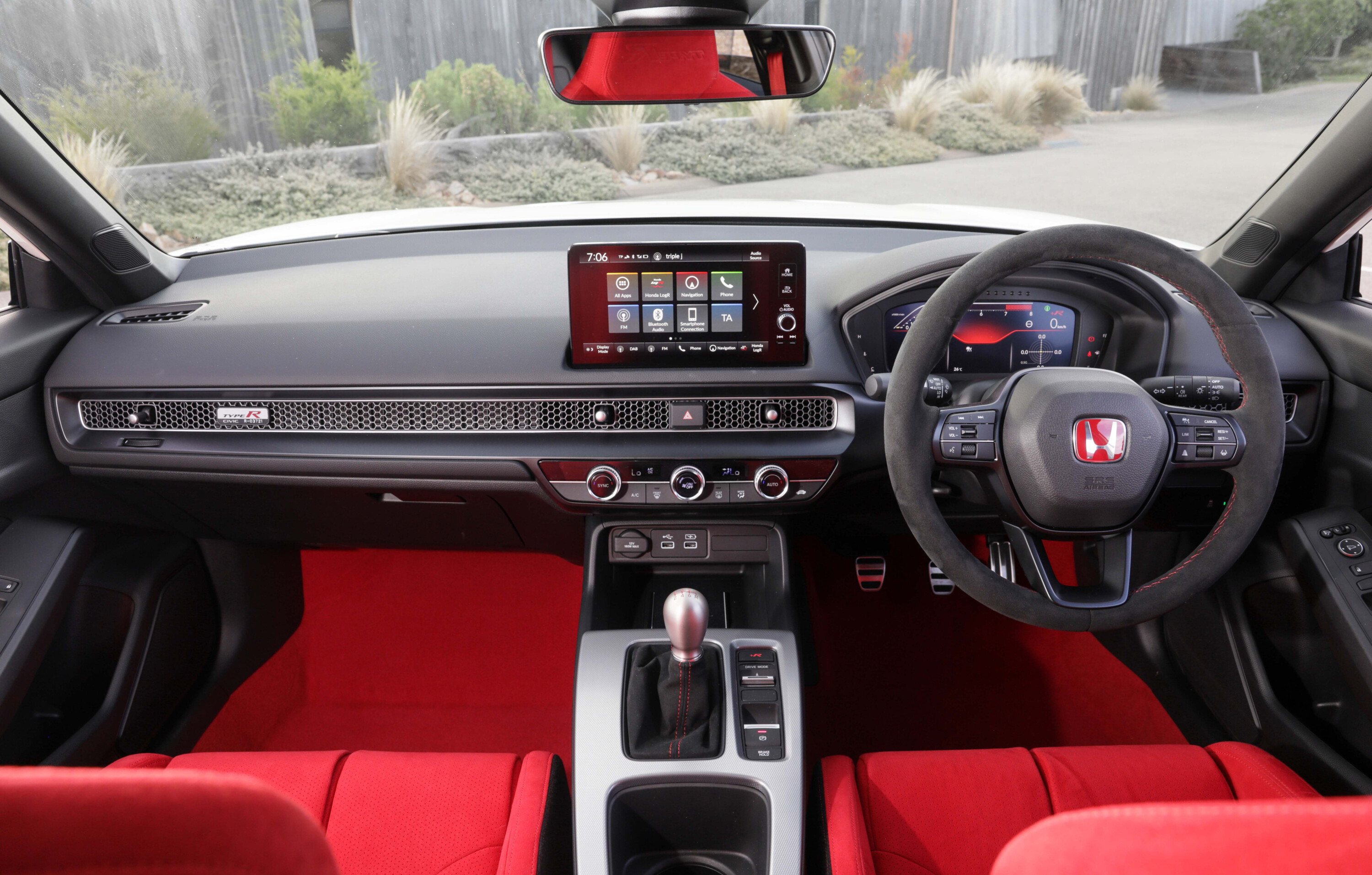
The front seats are some of the best we’ve ever sat in (more on these later and yes, they are now even redder than before), the snickety short-throw manual gearshift is a highlight, and the way the FL5 manages to combine laser-focused agility and pace with impressive back-road compliance is truly remarkable.
A caveat to all this, however, is that the Type R is now worryingly expensive. Just like iceberg lettuce and almond lattes, the Type R’s sticker price has gone up and this new model costs $72,600 drive-away. That’s about a $12K hike over the old car once you factor in on-road costs and a decent wedge more than most of its key rivals. Ouch.
So what does your outlay buy you? Well, you are scoring more metal for your money. At almost 4.6 metres long and 1.9 metres wide, the Type R is closer to a Subaru WRX sedan for size than a traditional hot hatch. And this new model is 37mm longer, 15mm wider and 13mm lower than the car it replaces, plus its wheelbase has also been stretched by 35mm.
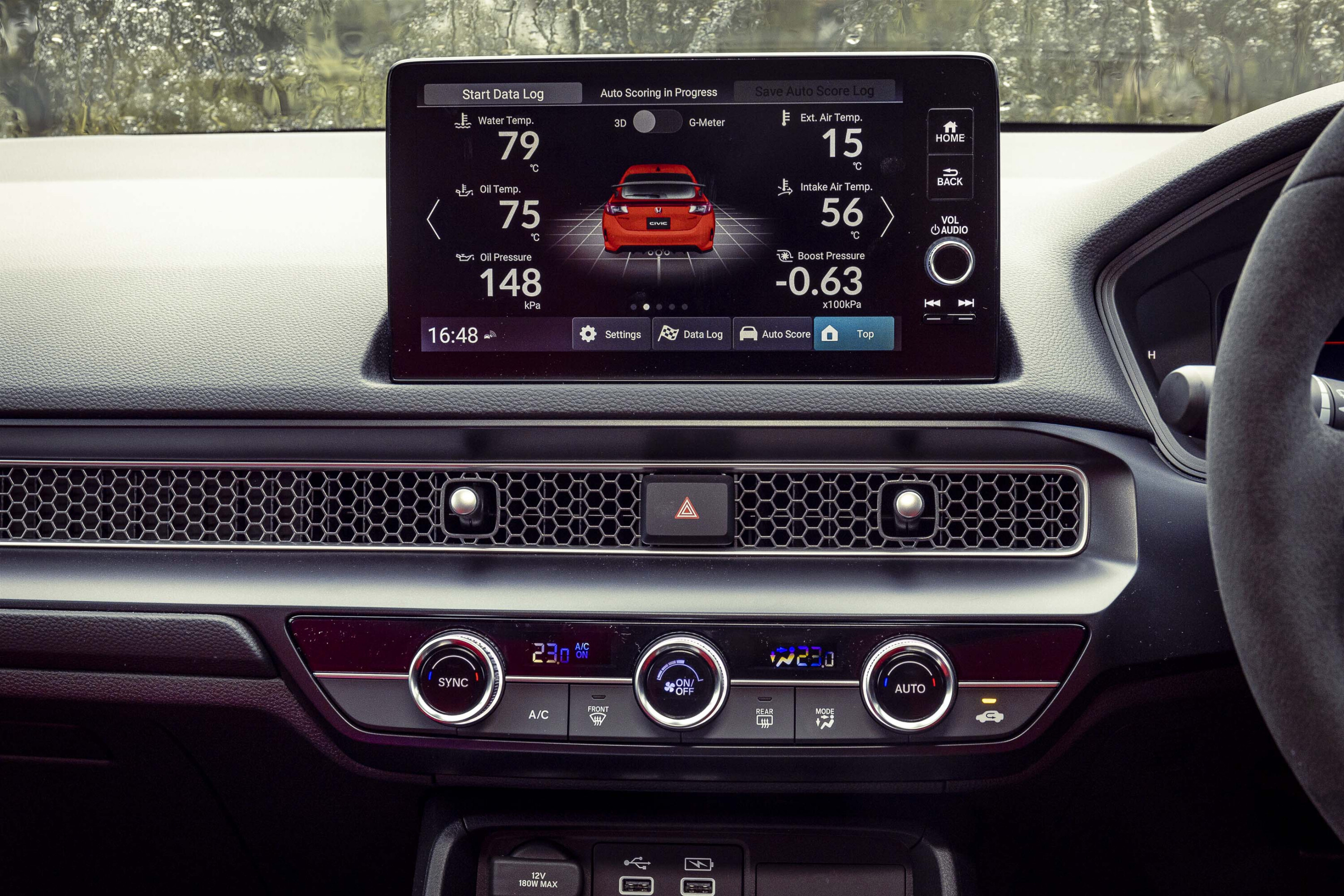
The upshot of this extra size is one of the roomiest interiors of any hot hatch and the Type R’s cabin feels spacious, comfortable and richly equipped. It’s still only a four-seater, mind, (the middle rear seat is taken up by a pair of fixed cup holders) but the list of standard gear is generous. As standard, every Type R gets:
| 2023 Honda Civic Type R standard features | |
|---|---|
| 9.0-inch central touchscreen | Reversing camera |
| 10.2-inch digital driver display | LED headlights and tail lights |
| Wireless phone charger | 19-inch forged alloy wheels |
| Android Auto | Four drive modes |
| Apple CarPlay (wireless) | Active exhaust |
| Dual-zone climate control | Adaptive suspension |
| Eight-speaker sound system | Limited-slip front differential |
| DAB+ radio | Brembo brakes |
| Sat-nav | Honda LogR data logger system |
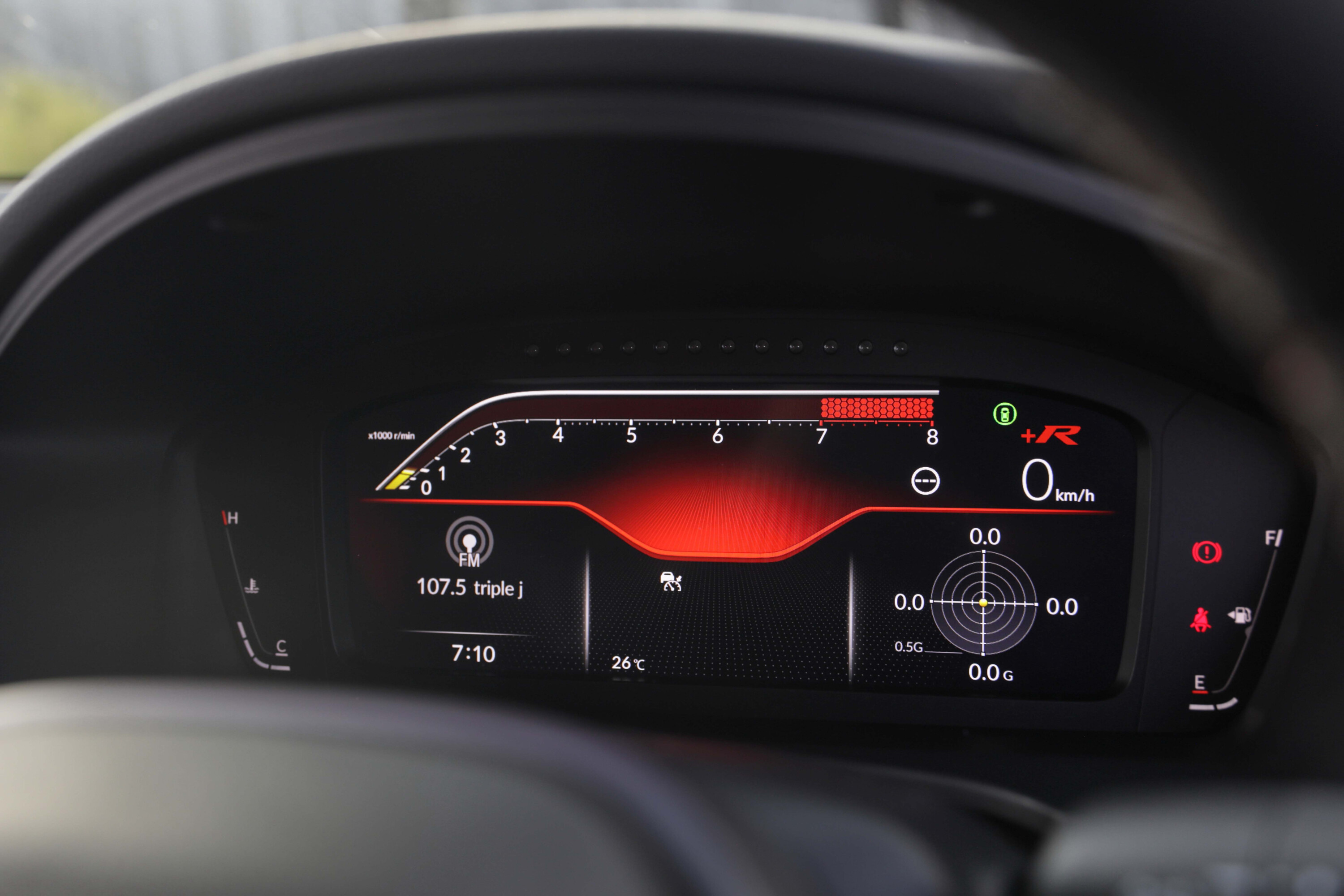
You’re also buying Honda’s fastidious attention to detail. The new aluminium bonnet, for example, is 43 per cent lighter than the old car’s and the tailgate is now made of resin, which delivers a 20 per cent weight saving.
The body is stiffer, too, thanks to the use of 3.8 times more structural adhesive and newly designed lower control arms in the front suspension provide a 16 per cent increase in camber rigidity.
Even the wheels are lighter, not only because they’re an inch smaller at 19 inches (something that lends the new Type R an extra dose of ride compliance), but because they’re forged rather than cast which helps to reduce unsprung weight by a significant 2.8kg at each corner.
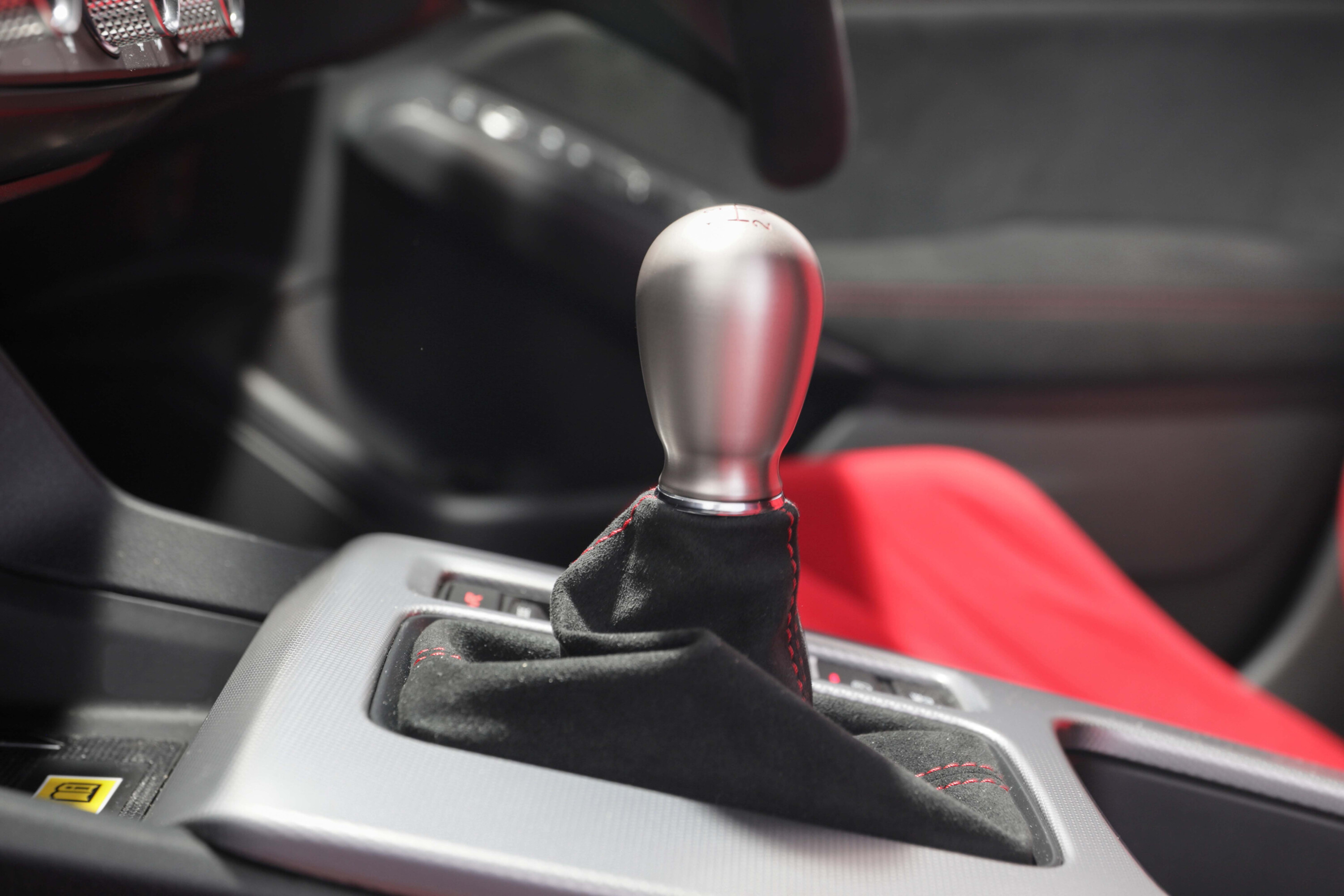
The engine, too, has been improved. There are fewer turbine blades in the turbo to help boost response and the flywheel is 18 per cent lighter which reduces inertia in the driveline by 25 per cent, again helping to make the engine feel livelier and more responsive.
You also get more power with outputs lifting from 228kW in the old car to 235kW. Torque gets a 20Nm lift for a max rating of 420Nm @ 2500-4000rpm.
The result of all this? In isolation, the changes might seem small but combine them and you get one of the best front-driven hot hatches ever made.
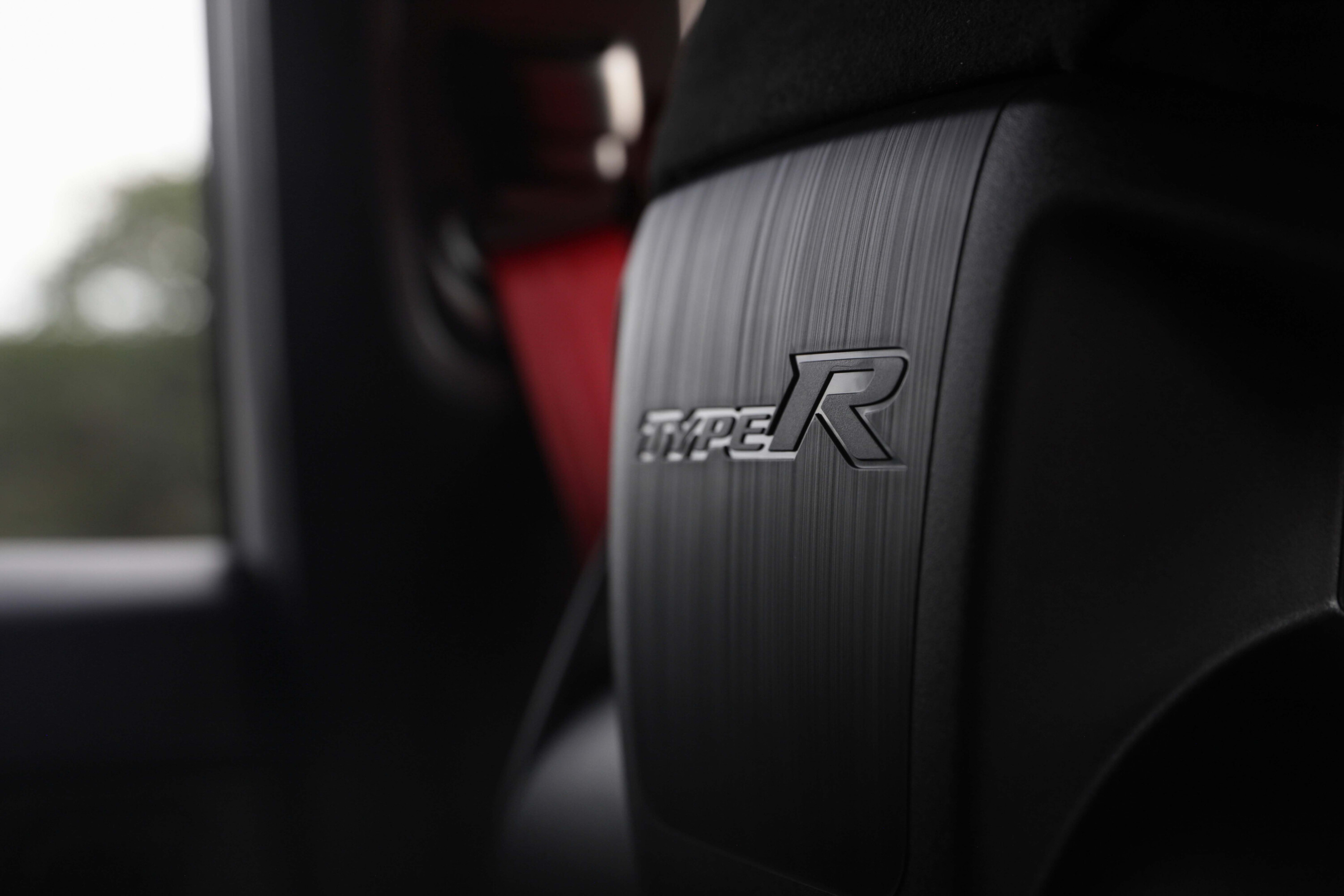
How do rivals compare on value?
Talk that the hot hatch segment is dying is, to use a Trumpism, fake news. Sure, some big players have pulled the ripcord – even pioneer Renault has left – but new brands are wading into the fray. Toyota is a notable newbie and it now has two players in this segment with the GR Corolla joining the smaller GR Yaris.
Both undercut the Civic on price – a GR Corolla is $62,300 while the GR Yaris Rallye is $54,500 (both before on-road costs) – and they also offer an enticing degree of rally-bred pedigree with their bespoke 1.6-litre three-cylinder engines and torque-splitting all-wheel-drive systems.
Neither can match the Honda for interior quality or space (the GR Yaris is especially hampered for rear-seat room and suffers from a driving position that’s too high) and the Honda also holds the edge when it comes to steering feel, ride quality and the shift action of its six-speed manual.
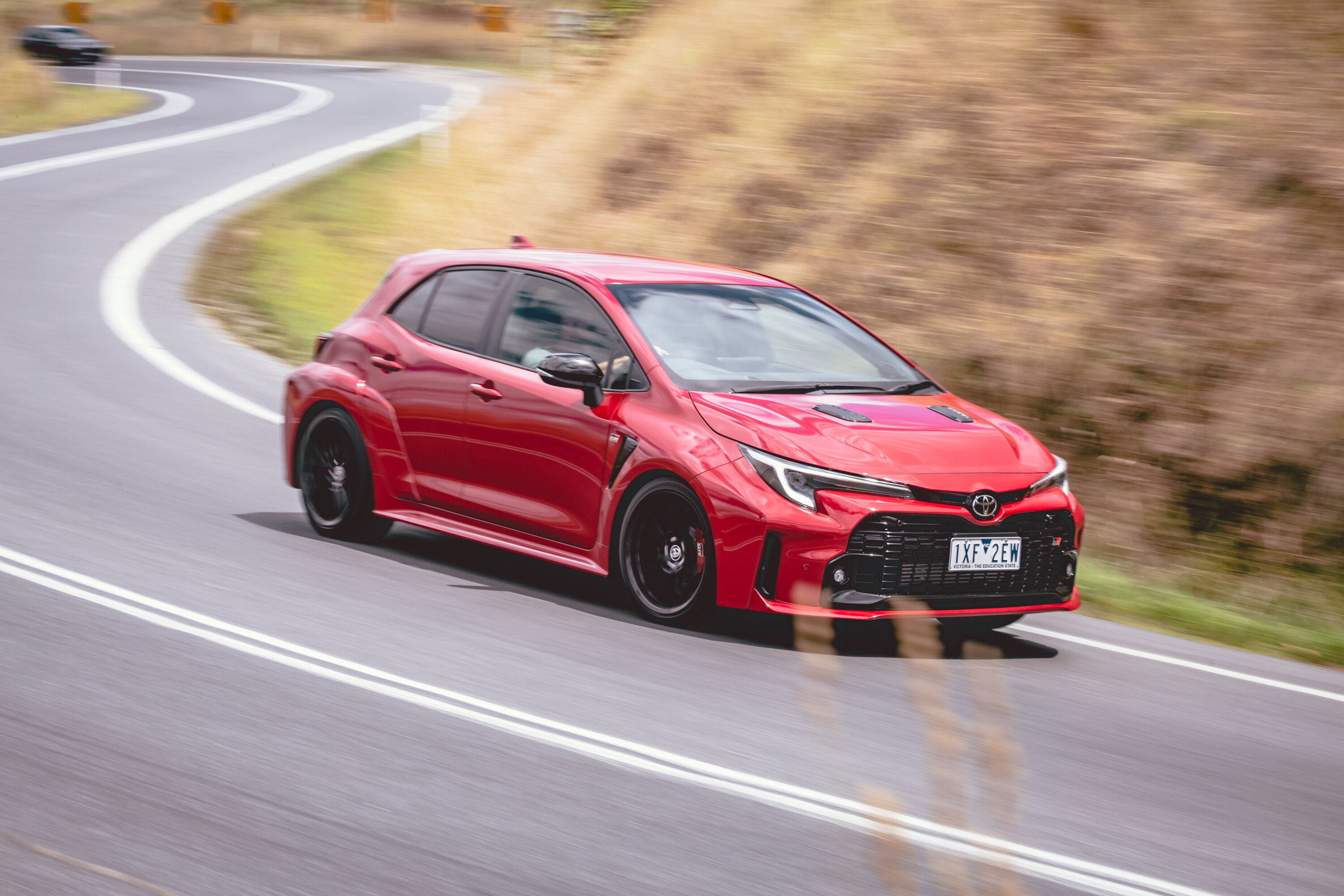
Perhaps the car the Civic will be compared to most is the Volkswagen Golf R. Now in its eighth generation, the venerable VW has long been the yardstick for hot hatches looking to combine searing pace with everyday comfort. It’s not only quicker than the Type R from 0-100km/h (4.8sec plays 5.4) but it’s a smidge cheaper too, at $66,990 before on-road costs.
You also gain the added surety of all-wheel drive and Drift Mode. But the numbers only tell part of the story. While the VW might be quicker off the line, once you’re moving the Honda is the faster car (check out the power-to-weight ratios in the below table). And the Honda is probably the more rewarding car to drive, too, thanks to its greater sense of connection and its masterful manual shift.
| Civic Type R | Golf R | GR Corolla | GR Yaris Rallye | i30 N sedan | |
|---|---|---|---|---|---|
| Engine | 2.0L 4cyl turbo-petrol | 2.0L 4cyl turbo-petrol | 1.6L 3cyl turbo-petrol | 1.6L 3cyl turbo-petrol | 2.0L 4cyl turbo-petrol |
| Power/torque | 235kW/420Nm | 235kW/400Nm | 221kW/370Nm | 200kW/370Nm | 206kW/392Nm |
| Weight | 1429kg | 1558kg | 1485kg | 1280kg | 1445kg (manual) |
| Power-to-weight | 164kW/tonne | 151kW/tonne | 149kW/tonne | 156kW/tonne | 143kW/tonne |
| Gearbox | 6-speed manual | 7-speed dual-clutch | 6-speed manual | 6-speed manual | 6sp manual/8spd dual-clutch |
| Drive | front-wheel | all-wheel | all-wheel | all-wheel | front-wheel |
| 0-100 (claimed) | 5.4sec | 4.8sec | 5.3sec | 5.2sec | 5.8sec |
| Price | $72,600 drive-away | $66,990 + on-road costs | $62,300 + on-road costs | $54,500 + on-road costs | $50,200 + on-road costs |
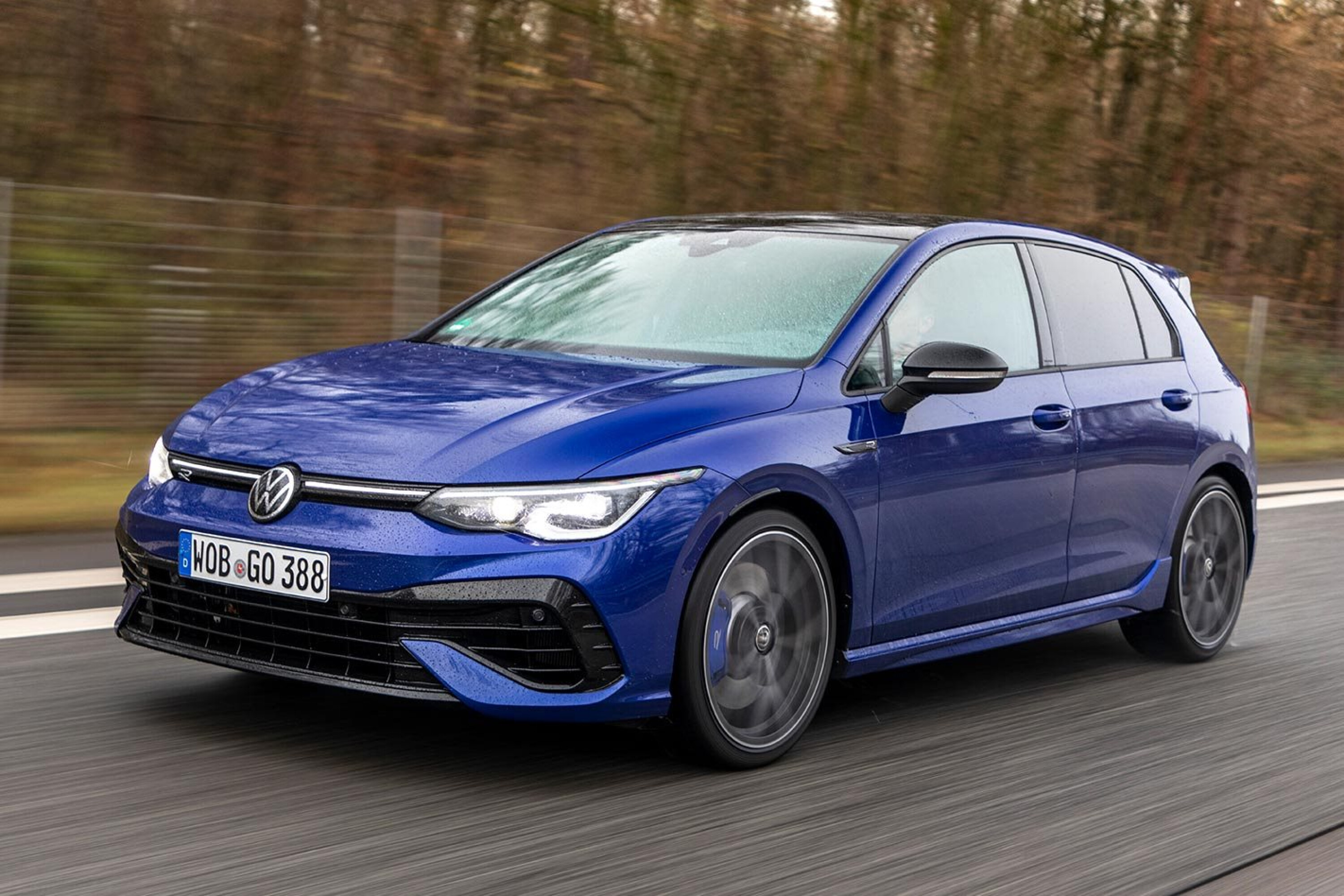
Where the Golf R serves as a benchmark all-rounder, the car the Civic has to trump dynamically is the Hyundai i30 N.
It’s even more affordable again at $50,200 (before on-road costs) for the i30 N sedan, which is currently the only i30 N body style you can buy in Australia, and although it’s outgunned by the Honda for outright performance (235kW/420Nm vs 206kW/392Nm), the Hyundai is more overt and charismatic in how it drives. It’s properly quick, too, and a recent update has also gifted the chassis some much-needed compliance.
So the good news is that if you haven’t yet placed an order for a Type R, there are plenty of other excellent options to choose from. But as we’ll get to in a minute, the Type R is certainly worth waiting for…
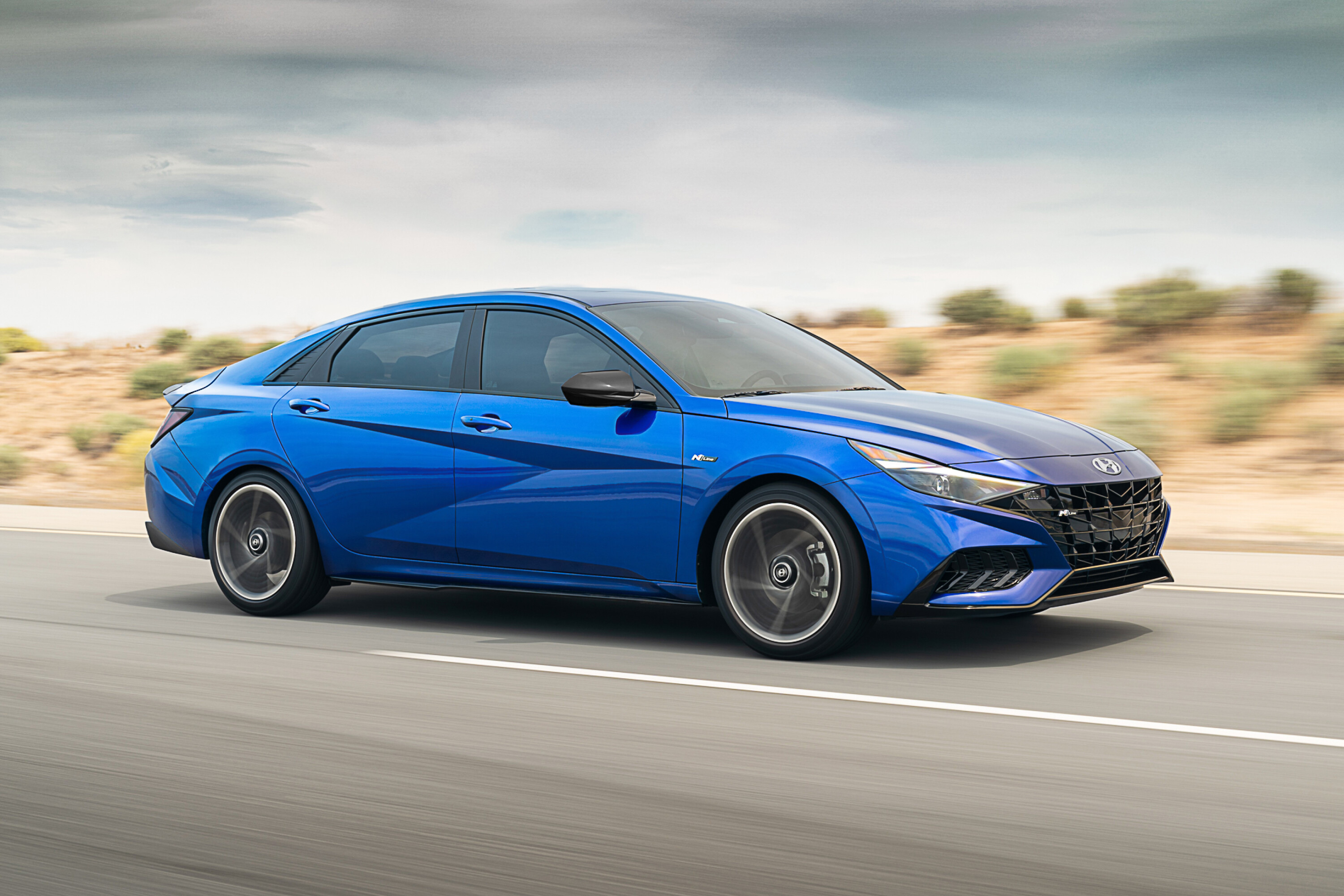
Interior comfort, space and storage
The first thing that strikes you about the Type R’s cabin is just how superb the driving position is. You sit lower than the old car, by 8mm, and the seat itself is one of the best we’ve ever sat in. Heavily bolstered and clad in grippy, bright red suede, the front buckets are phenomenally supportive and comfortable.
Manual adjustment, though, and the backrest is a lever rather than an infinity dial but it’s still relatively easy to attain the driving position you want.
The second thing you notice is the steering. Like the seat, the wheel itself is beautifully designed. Thin-rimmed and wrapped in Alcantara, it’s a pleasure to hold. And even better to use. Dial in a micron of lock and you’ll discover there’s zero slack off centre and that there’s even a decent degree of feel and feedback.
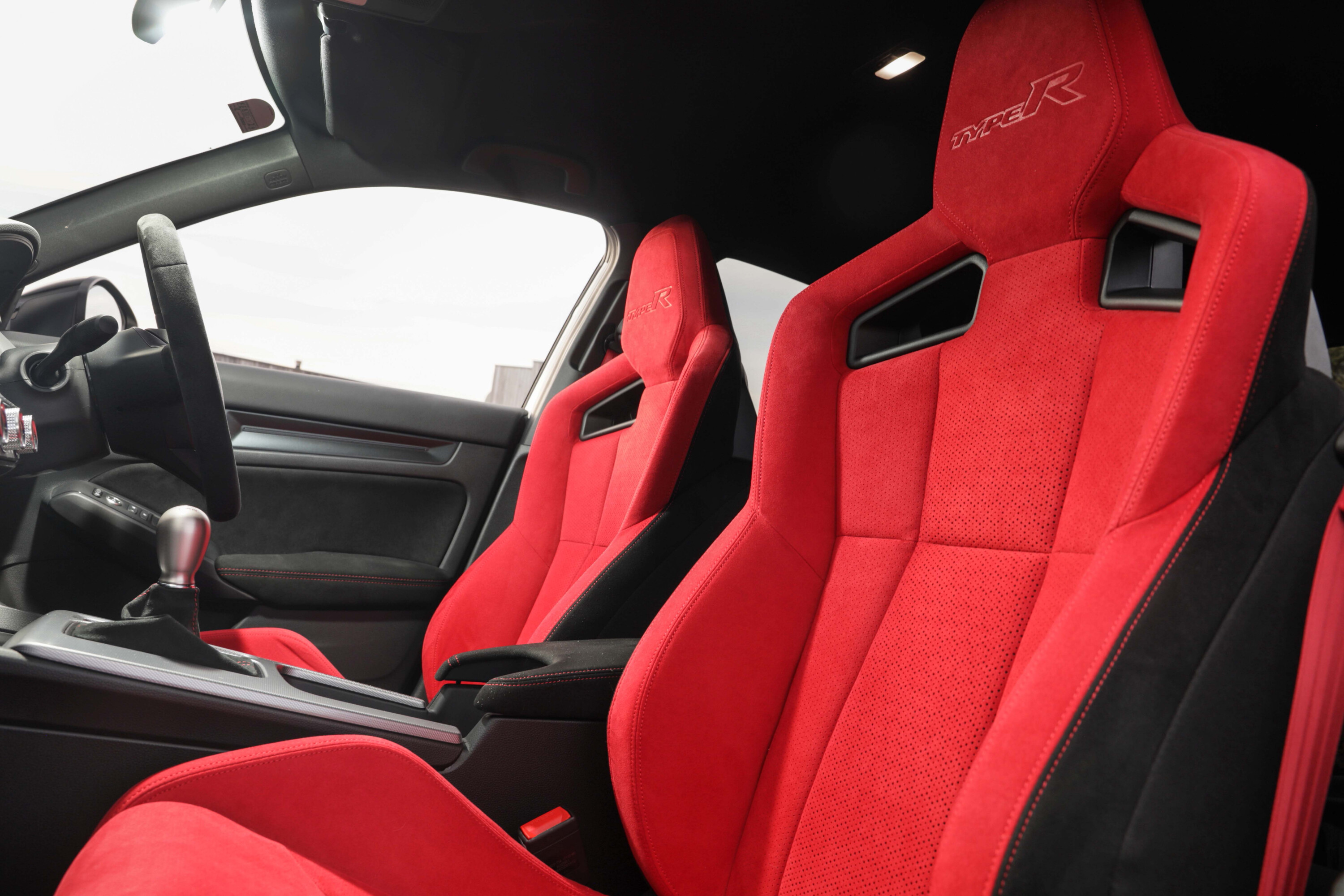
The steering weight is nicely judged, too. Firm without being overly heavy, it’s a reassuring companion from the get-go. Like a handshake from Chris Hemsworth.
Other controls are equally excellent. The brake pedal is immediate with no dead zone or sneeze factor at the top of its travel and even in city traffic, the six-speed manual is a tactile delight. The metal shifter feels cold in your hand and the ratios snick home smoothly and precisely, with only the slightest hint of notchiness when the car is cold.
And around town, the Type R is surprisingly easygoing. Vision out is good, with a low scuttle providing a panoramic forward view, while the large rear wing is cleverly positioned so it doesn’t impede your vision through the rear glass. Only the rear three-quarter view is a touch obscured but even there, this generation of Civic has additional portal windows that allow more light into the cabin.
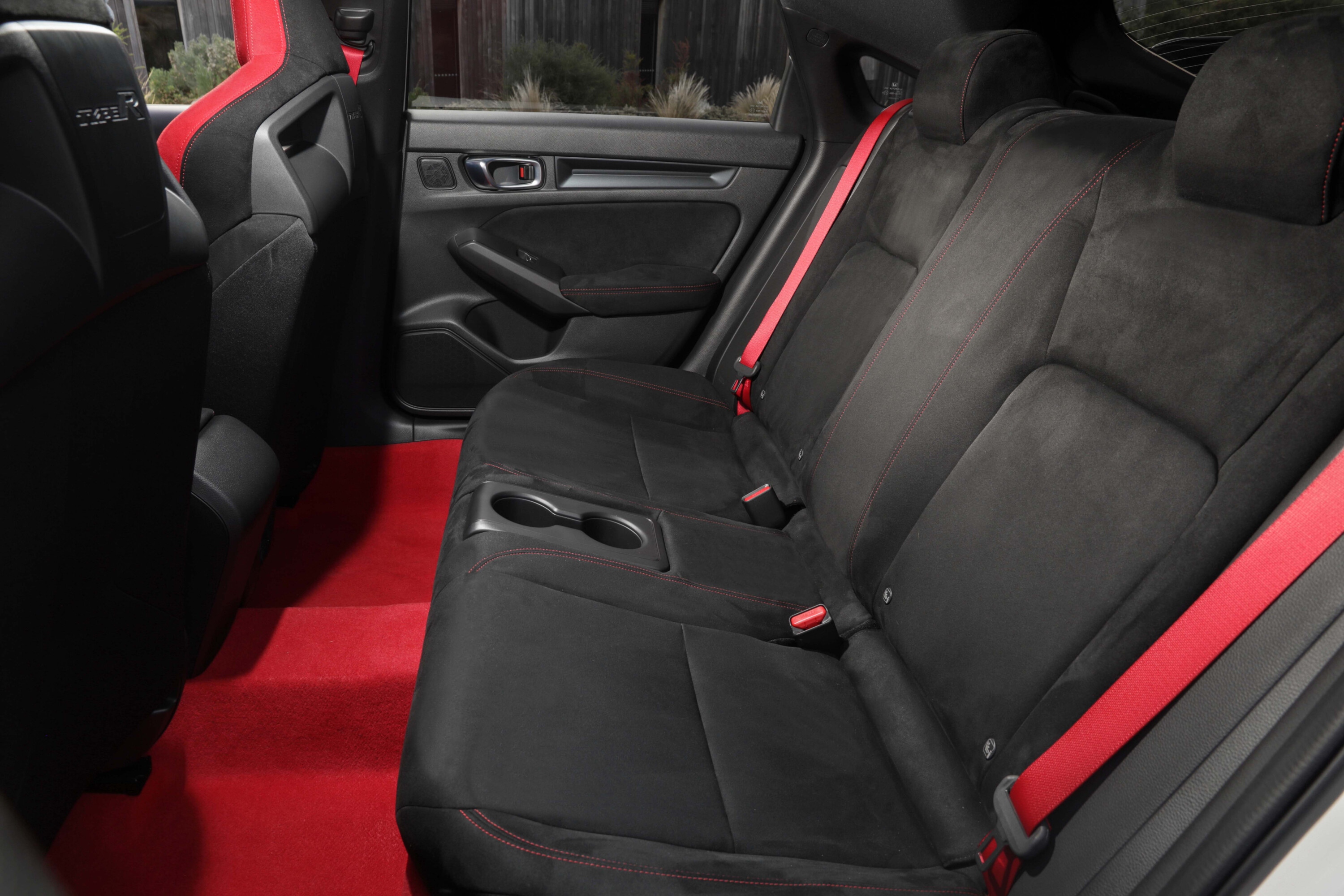
The ride is also impressively compliant. In a Hyundai i30 N, which is one of our favourite hot hatches, speed bumps and potholes can thunk and bump but in Comfort mode, the Type R’s adaptive dampers deliver a ride that’s taut but compliant. You could easily daily this car, which is exactly as it should be in a hot hatch.
No complaints about the rest of the cabin, either. The interior design is clean and minimal and the ergonomics are spot on. The HVAC dials are within easy reach (and not buried in a touch screen!) and they also deliver a pleasing tactile click when you twist them.
Front storage is generous thanks mostly to a deep cubby behind the gear shifter that houses twin cup holders and you also score a covered storage bin at your left elbow and generous door pockets. Minor gripe? The door pockets aren’t lined, so smaller items slide around noisily.
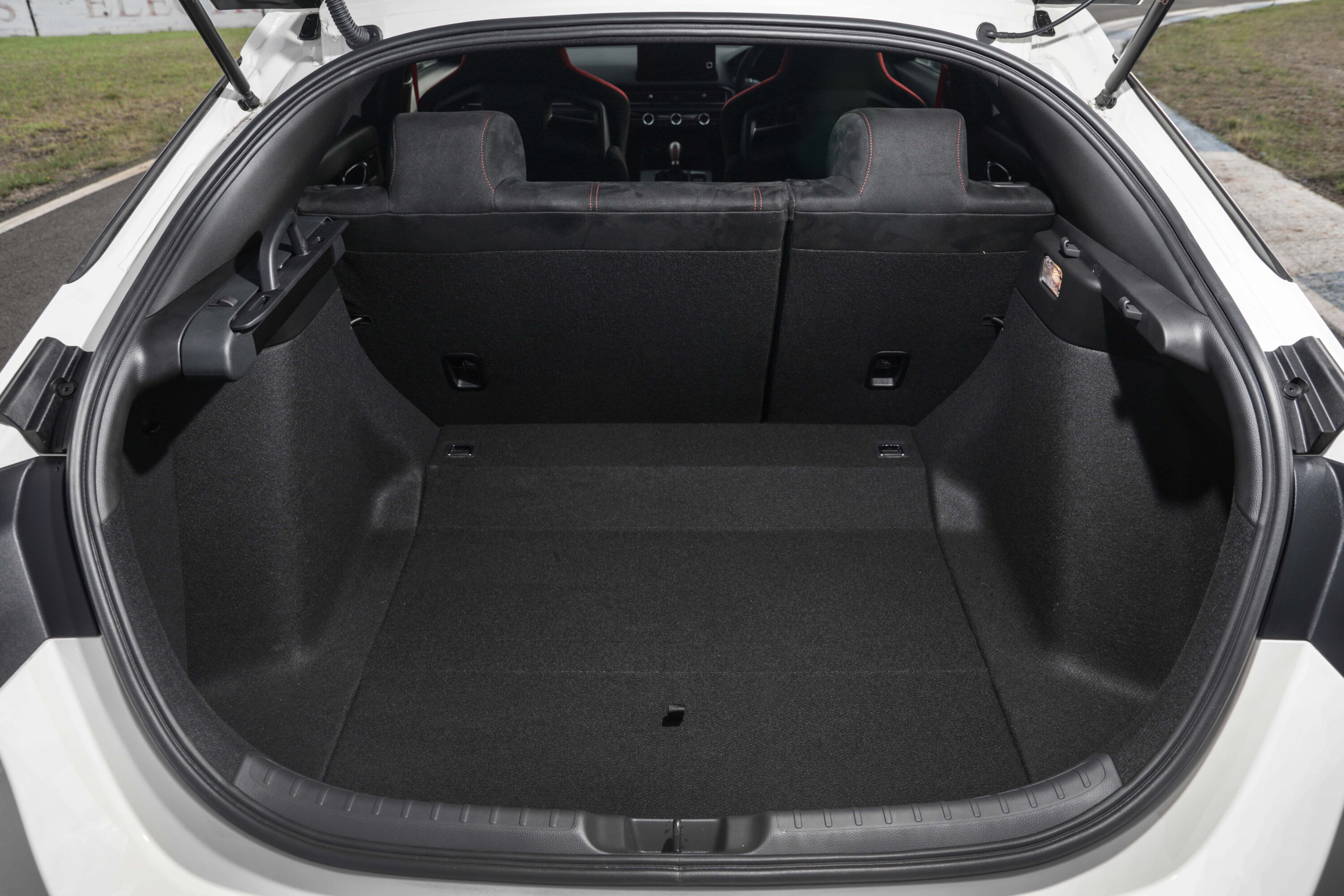
The mix of materials used elsewhere, though, is of high quality. All of the touch points are soft, from where you put your elbows to the plastics used on the door cards and dash and we’re big fans of the red carpet. Fit and finish is also impressive.
Connectivity-wise, you score twin USB-A ports up front (why no USB-C, Honda?) and a wireless charging pad but there are no USB ports in the rear seat. In fact, there’s quite a lot missing if you’re a rear passenger. There are no air vents, there’s no middle seat and storage is on the skinny side given there are no map pockets and only small door pockets.
Headroom is also tight for tall passengers (our hair brushed the ceiling), plus while the rear bench is deep and comfortable it lacks the kidney-hugging lateral support of the front buckets. There’s no centre armrest either, leaving only a grab handle on the roof to hold yourself in place if the driver is engaged in some enthusiastic cornering.
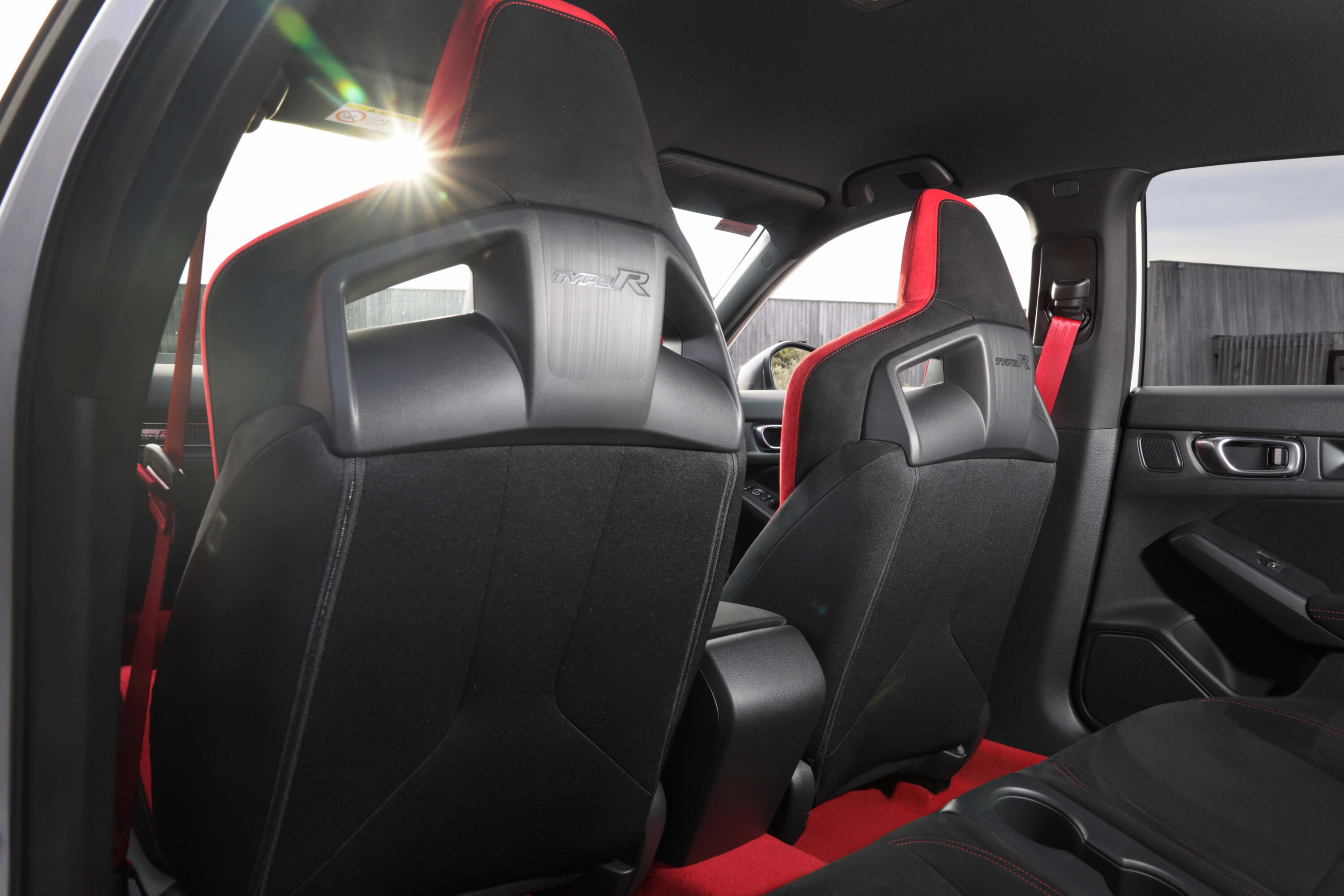
Happily, the general sense of rear space is excellent. Six-footers can easily sit behind one another and still have ample knee- and toe-room, plus vision out is good thanks to the low window line.
The boot is also generous at 410 litres, though again some desirable amenities are missing. There’s no auto tailgate or spare tyre of any kind. You do score a puncture repair kit, a flimsy cargo blind, a light, and four tie-down points.
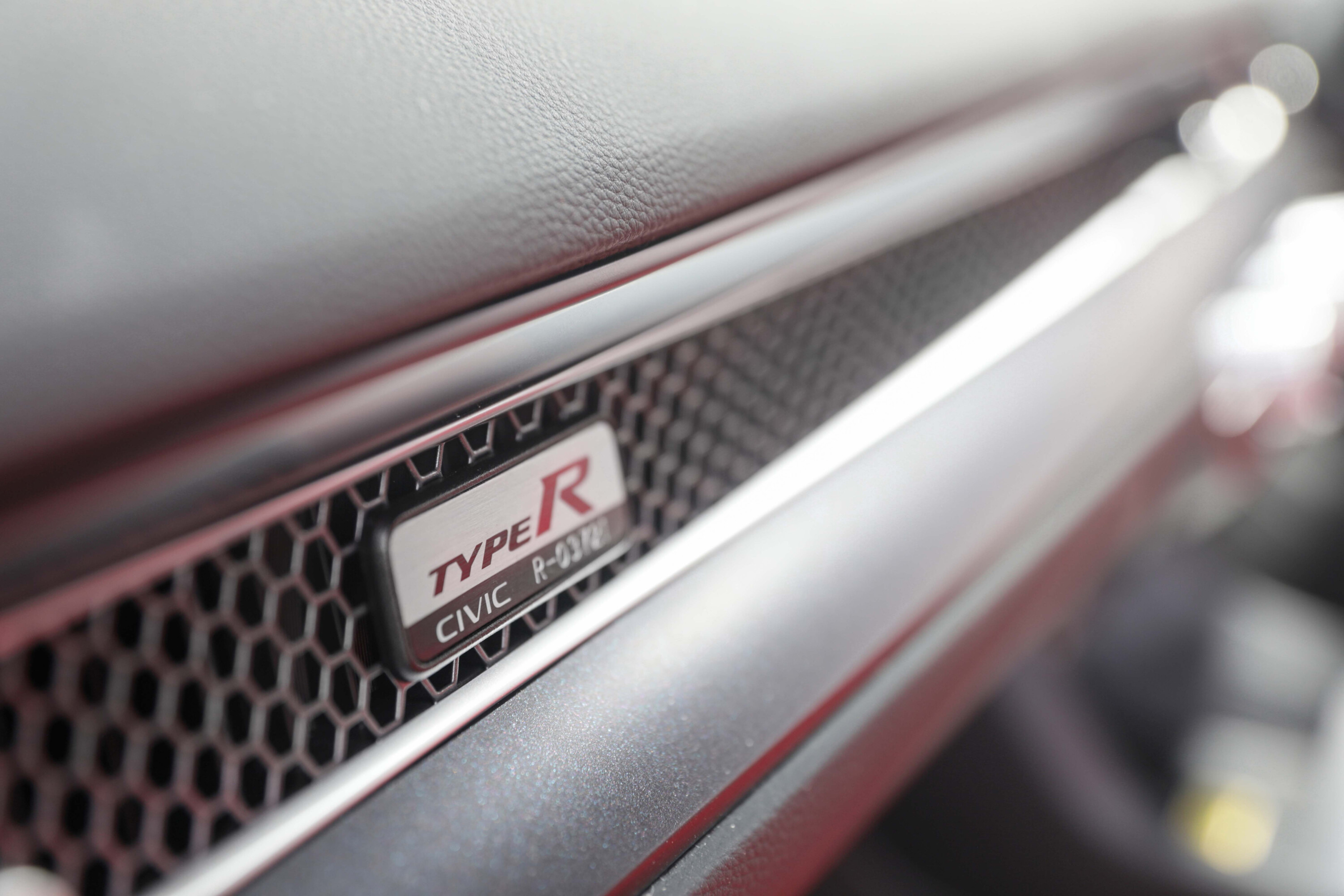
What’s it like to drive?
In a word, sublime. Our first taste of the Type R in anger is on a serpentine section that runs up to an Alpine resort and the roads are sopping wet. Covered in moss and detritus, they’re also cloaked in thick mist and the mercury is hovering around 4ºC.
Hardly ideal conditions for a hot hatch that sends 235kW through the front treads, and yet, the Type R is incredibly confidence-inspiring. Grip levels from the standard Michelin Pilot Sport 4S tyres are impressively high (at 265/35 R19 they’re 20mm wider than the old car’s) and it’s soon apparent that you can push much harder than you expect.
The steering is a highlight. Naturally weighted in Comfort mode, it gradually gains heft as you cycle through the drive modes before becoming properly meaty in R+. It’s relatively quick at 2.1 turns lock-to-lock and there’s decent feedback, too, which gives you a good sense of how much adhesion you have at your disposal.
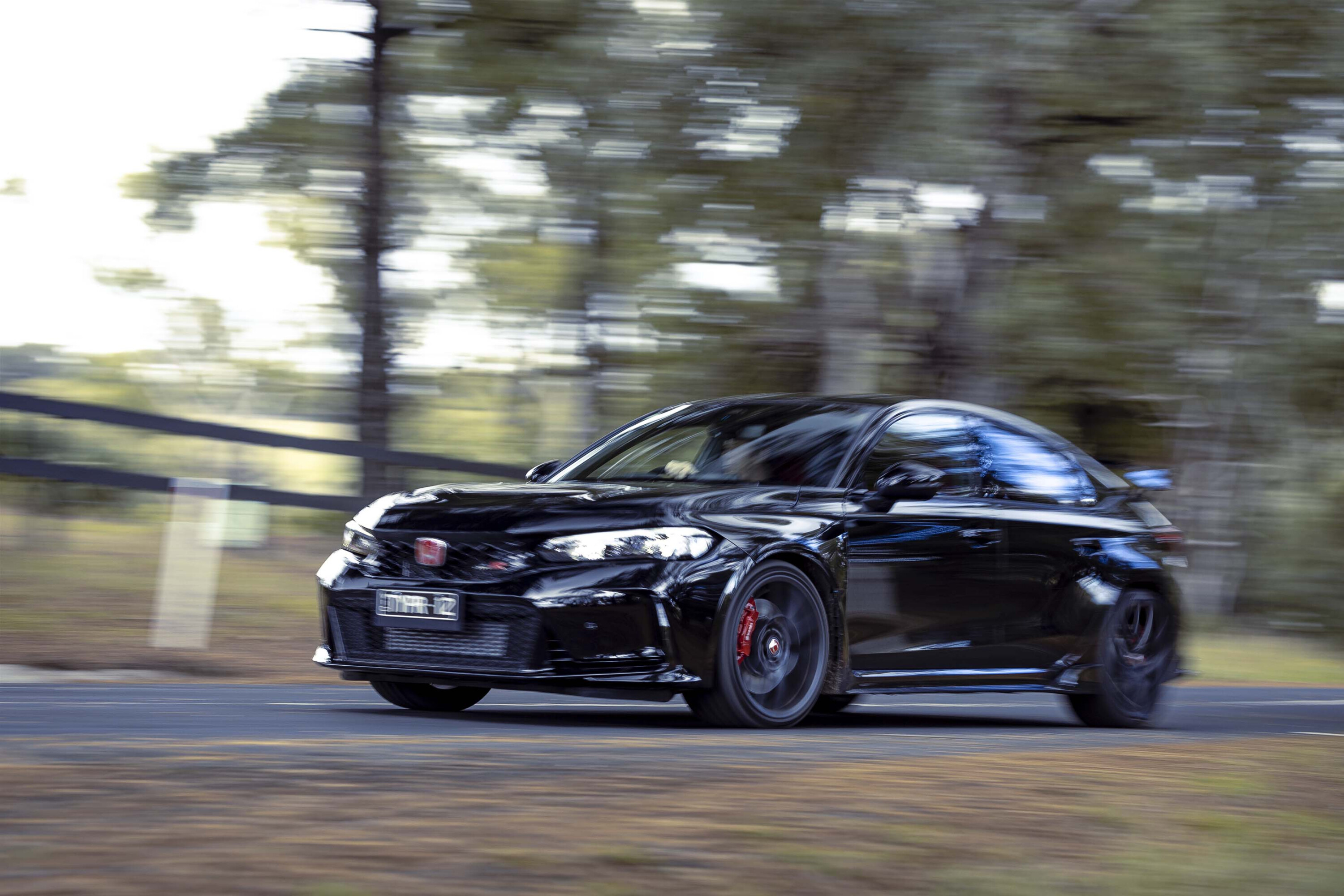
It’s also wonderfully free of corruption. Feed in the throttle out of tight second-gear corners and there’s nary a hint of torque steer. How have they done that exactly? It feels like witchcraft, especially on sopping roads.
Of course, Honda’s engineers haven’t been able to rewrite the rules of physics entirely. Get too greedy with the throttle or commit to it too early and the front axle will burst into wheelspin or push into power understeer but it’s remarkably easy to tread the line between slip and speed.
Part of that is down to the throttle which, although paired to a heavily turbocharged engine, is impressively linear and responsive. Combine that with the lighter flywheel and it’s easy to keep the Type R on the straight and narrow.
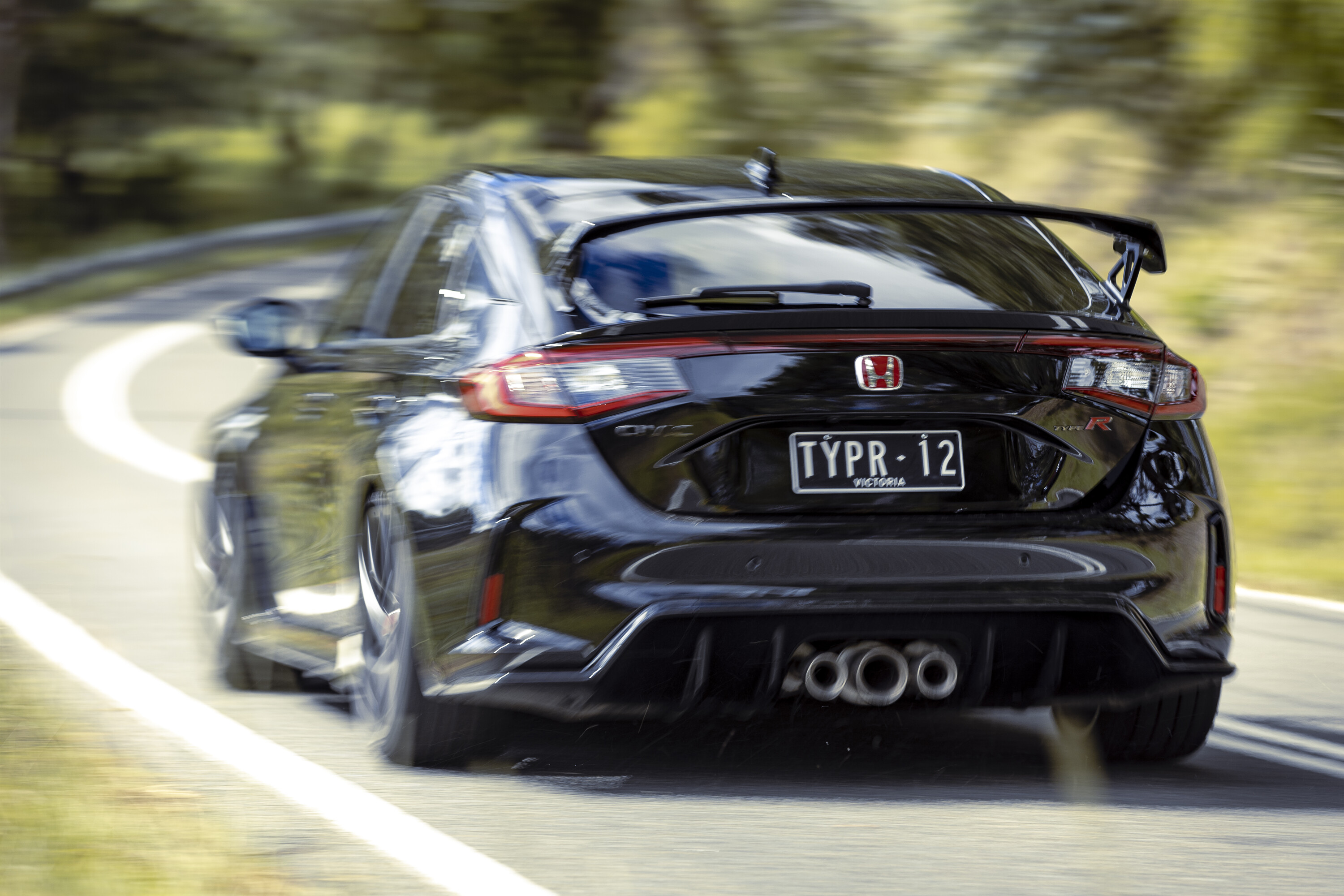
And it feels quick. Roll-on acceleration is strong and a full-bore pull through first and second gears delivers a rush that feels far more urgent than the official 0-100km/h time of 5.4 seconds suggests. Is it as quick as a Golf R? Not if 0-100km/h is your primary metric and, on wet roads, the all-wheel drive VW would likely pull out a gap. But the Honda is a masterclass in driver involvement.
One big part of that is down to the metal shifter that sits in your left hand. Is it the best manual shift on sale right now? Probably. The ratios aren’t overly short (top of second is 104km/h indicated, while third tops out at 145) but the engine is so torquey that I only find myself longing for shorter ratios so I can snick up and down the box more regularly just for the fun of it.
The shift action is wonderfully precise and engaging, with the short throw from second to third being especially gratifying.
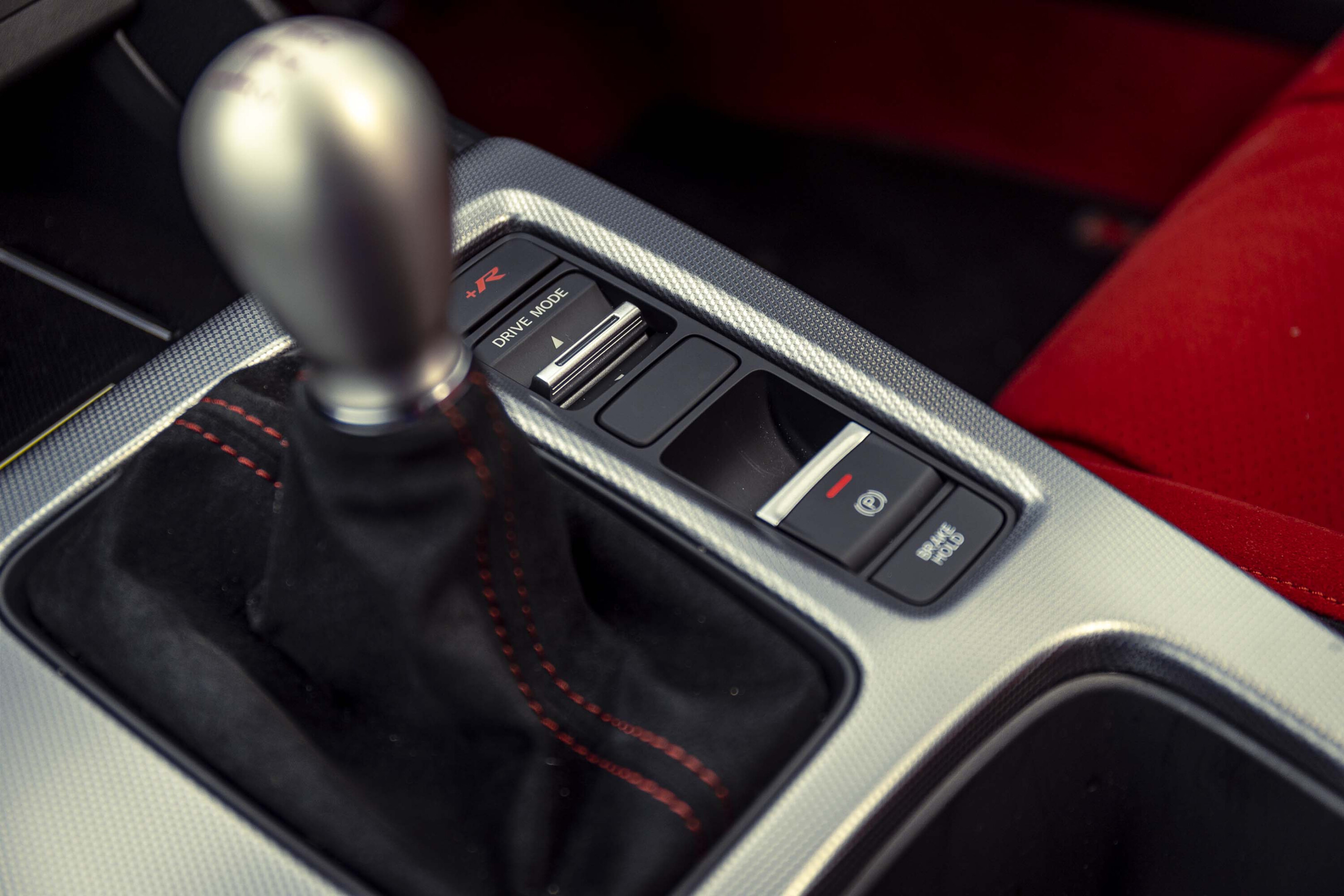
Lower grip surfaces also allow the Type R to display its playful side. While resolute grip is the overwhelming trait of the front axle (we only encountered the horrible shudder of understeer twice; power understeer was more of an issue) the rear axle is an equally talented companion. A slight lift from a constant throttle can help rotate the car while a sharper lift has the rear axle swinging around gracefully.
On drier and warmer roads (though still not completely dry) the Type R is even more impressive. The front axle is unwaveringly grippy and accurate and it’s impressive how much pace and confidence you can take into corners. The brake pedal comes into its own during this stint, too.
The master cylinder is new for this generation and while the pedal does soften slightly with heavy and repeated use, there’s still reassuring bite at the top of the travel and ample modulation on offer when you delve deeper into the pedal. The stopping power itself is impressive and it’s easy to modulate the braking performance on the cusp of ABS.
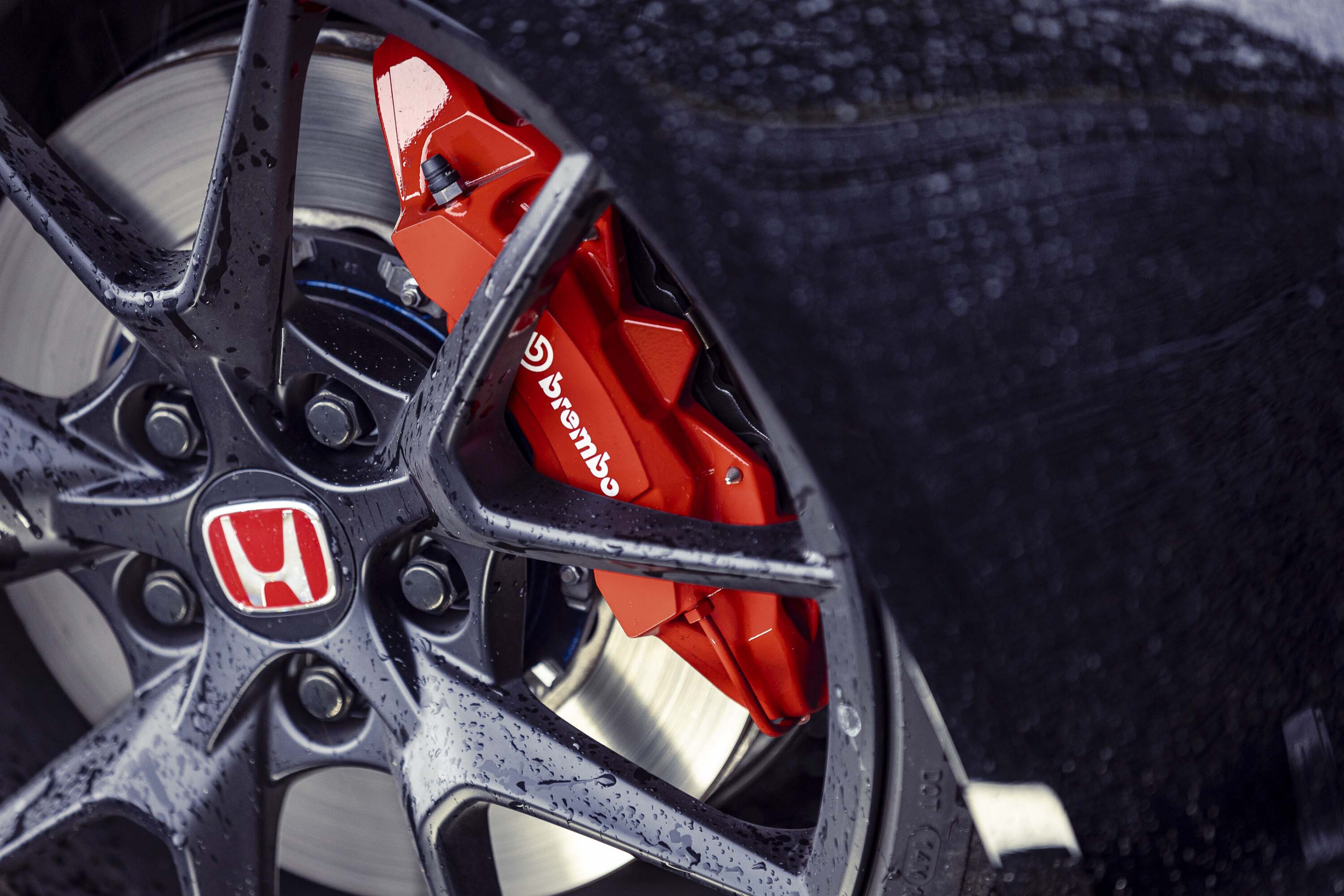
It all feels incredibly precise and approachable, which are traits only enhanced by how this new Type R rides. On roads that would have a GR Yaris or i30 N bucking and skipping, the Honda is remarkably controlled and compliant.
That’s partly down to its longer wheelbase and the fitment of smaller 19-inch alloys but Honda has also re-engineered the software that controls the three-stage adaptive dampers. The result is a car that feels stiff but never harsh, even in R+ mode on bumpy Aussie backroads.
A new Individual Mode means that should the road get overly choppy, you can switch the dampers to a more relaxed setting while keeping the rest of the dynamic package set to max attack. Nice.
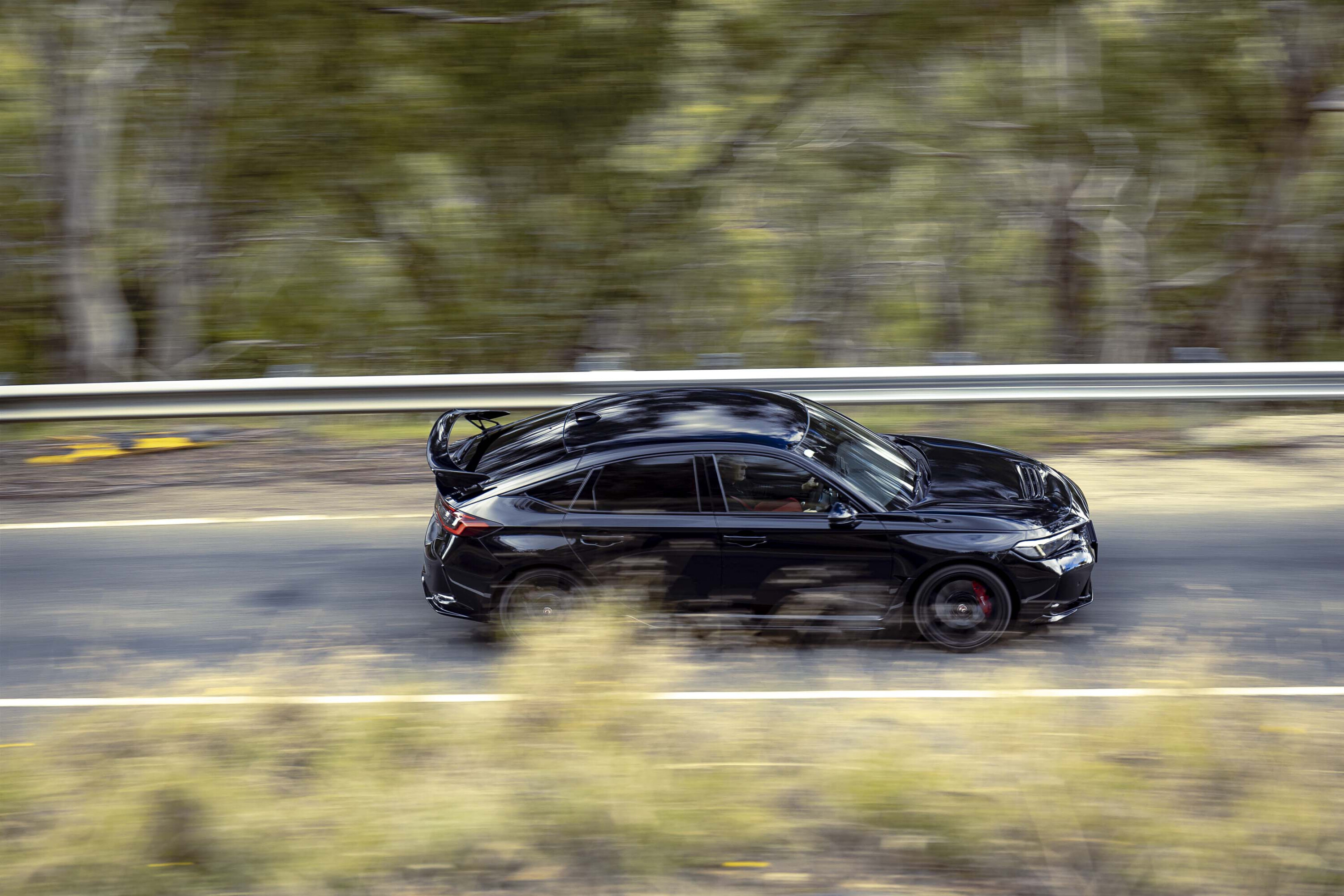
So what about noise? Well, in R+ mode there’s plenty of it thanks to ample amplification through the speakers but it’s more tuneless induction roar than actual exhaust note. Plus, there’s very little in the way of pops and bangs on the overrun. If you’re coming from an i30 N and are used to a high degree of off-throttle theatrics, you might miss that.
Weaknesses? Slow things down and you’ll notice a decent degree of road noise. It’s certainly an improvement over the old Type R, which could be properly noisy, but there’s still noticeable background roar, especially on coarse-chip roads.
And… that’s about it for obvious weak points. Dynamically, this latest Civic Type R is a masterful achievement.
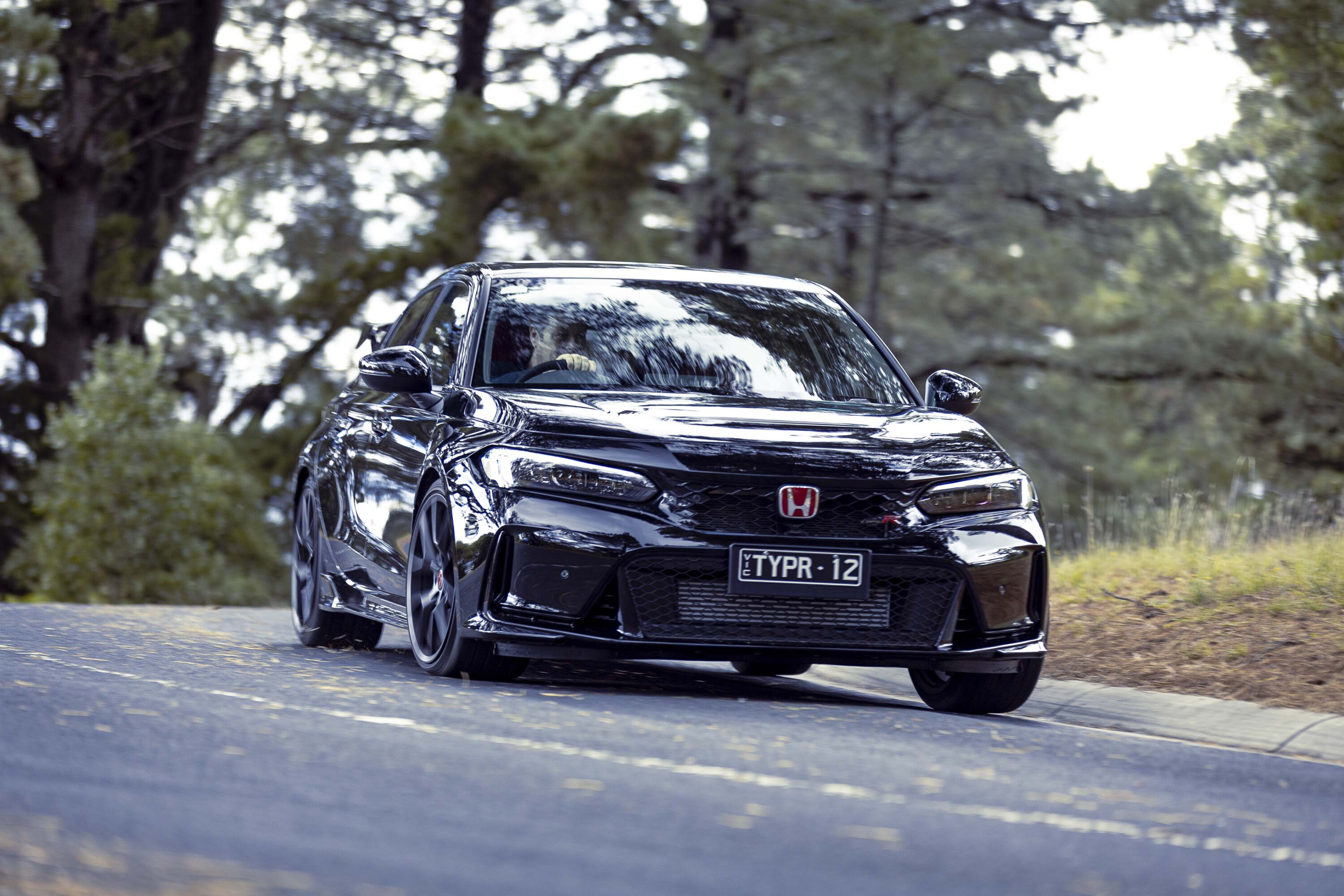
How much fuel does it use?
Officially the Honda Civic Type R drinks 8.9L/100km on the combined cycle. That’s a little above average for the class (an i30 N uses 8.2L while a Golf R is rated at 7.8L) and means you can bank on achieving around 380km from the 47L fuel tank.
During our testing over 265km of hard backroad driving, the Type R returned an economy figure of 13.3L/100km. For context, that’s actually thriftier than the fuel figures we recorded from a Subaru WRX and Toyota GR Yaris Rallye on the same roads.
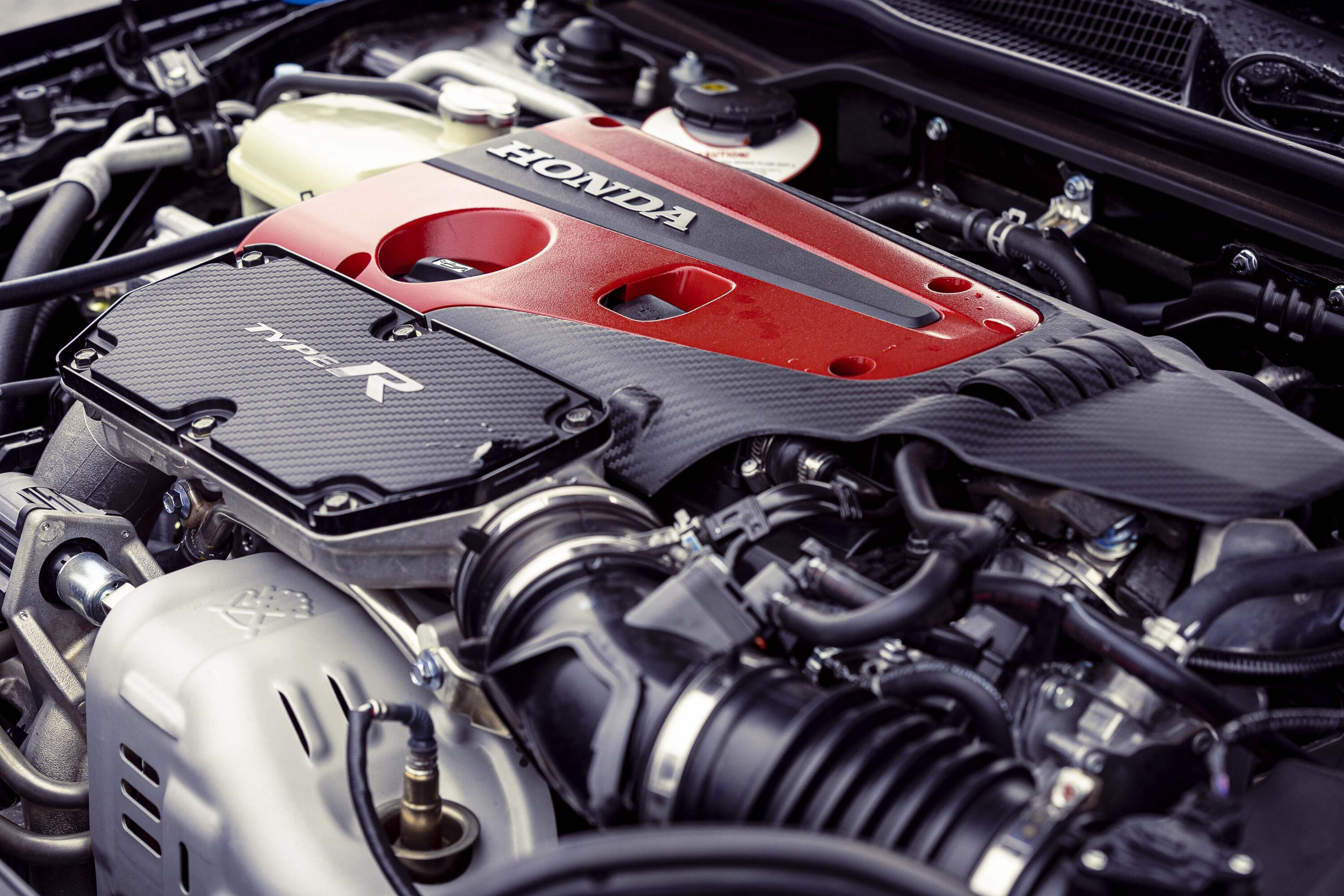
How safe is it?
The 2023 Honda Civic Type R does not carry an official safety rating and is yet to be crash tested by ANCAP. It does, however, have a decent list of standard safety features including:
| 2023 Honda Civic Type R safety features | |
|---|---|
| 10 airbags | Lane-keep assist |
| Autonomous emergency braking | Lane departure warning |
| Adaptive cruise control | Traffic sign recognition |
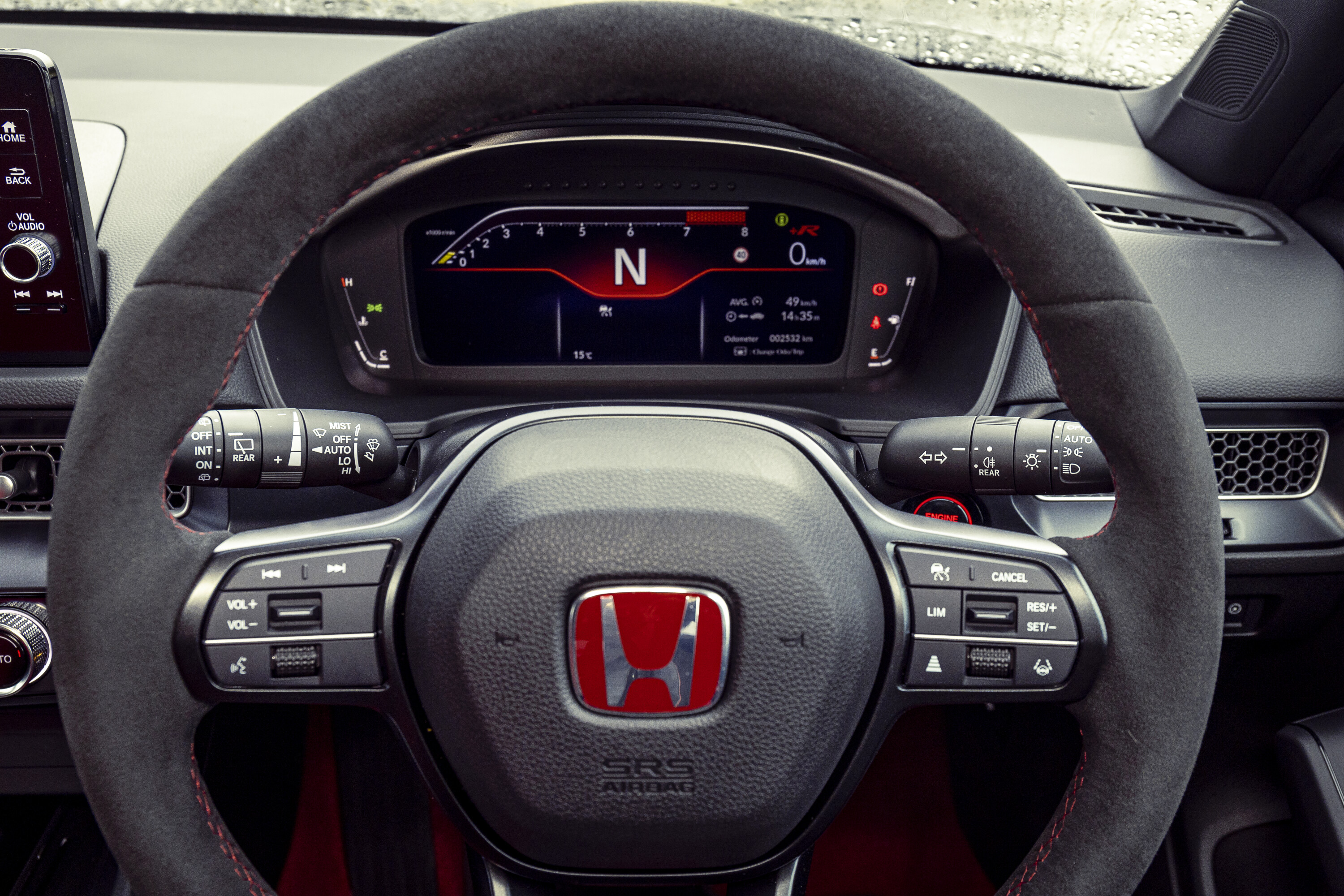
Warranty and running costs
Like Honda’s other models, the Civic Type R carries a five-year, unlimited-kilometre warranty. It also benefits from Honda’s “five low price services” scheme which caps the cost of each visit to the dealer at $199.
Scheduled services are every 12 months or 10,000km, meaning you’ll pay $995 to service your Type R over the first five years.
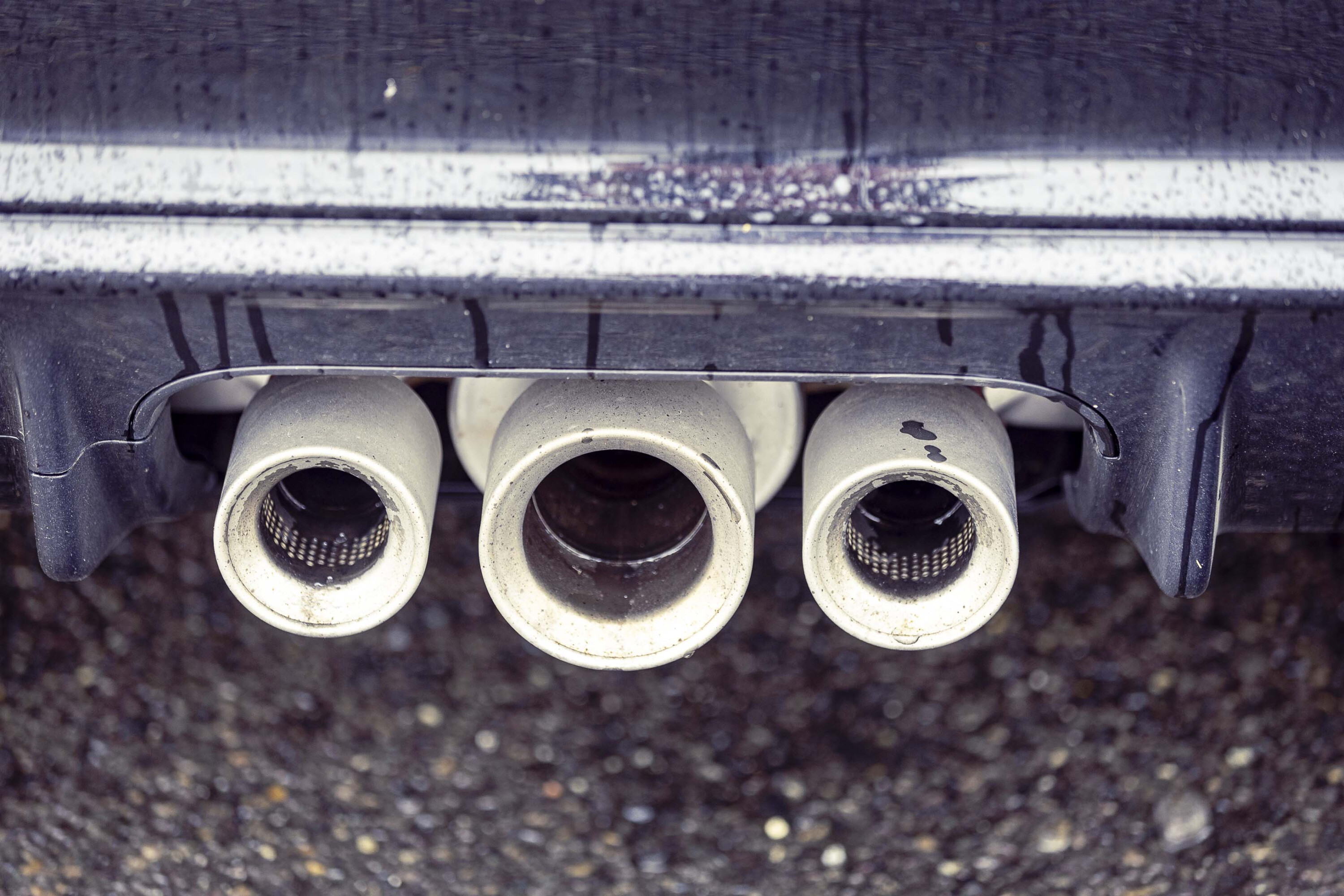
VERDICT
If you enjoy driving and the thrill that comes from perfectly dissecting a challenging section of road, then you’ll love this car. In a segment overflowing with excellent alternatives, the Type R stands tall for its dynamic cohesion, the fluency of its chassis and its high levels of driver involvement.
This is also a vastly different car to a Hyundai i30 N, a Toyota GR Yaris or even a VW Golf R. Where those rivals are more overt and brash, the Honda is more grown up, more mild-mannered and its focus is more singular: the joy and purity of driving.
Add the fact that it has the best power-to-weight ratio in its class and that it’s a surprisingly comfortable and roomy companion to drive every day, and the new Type R is seriously persuasive. Only the poorly equipped rear seat, the distant hum of road noise and the sharp price hike count against it.
Honda has built one of 2023’s best performance cars.
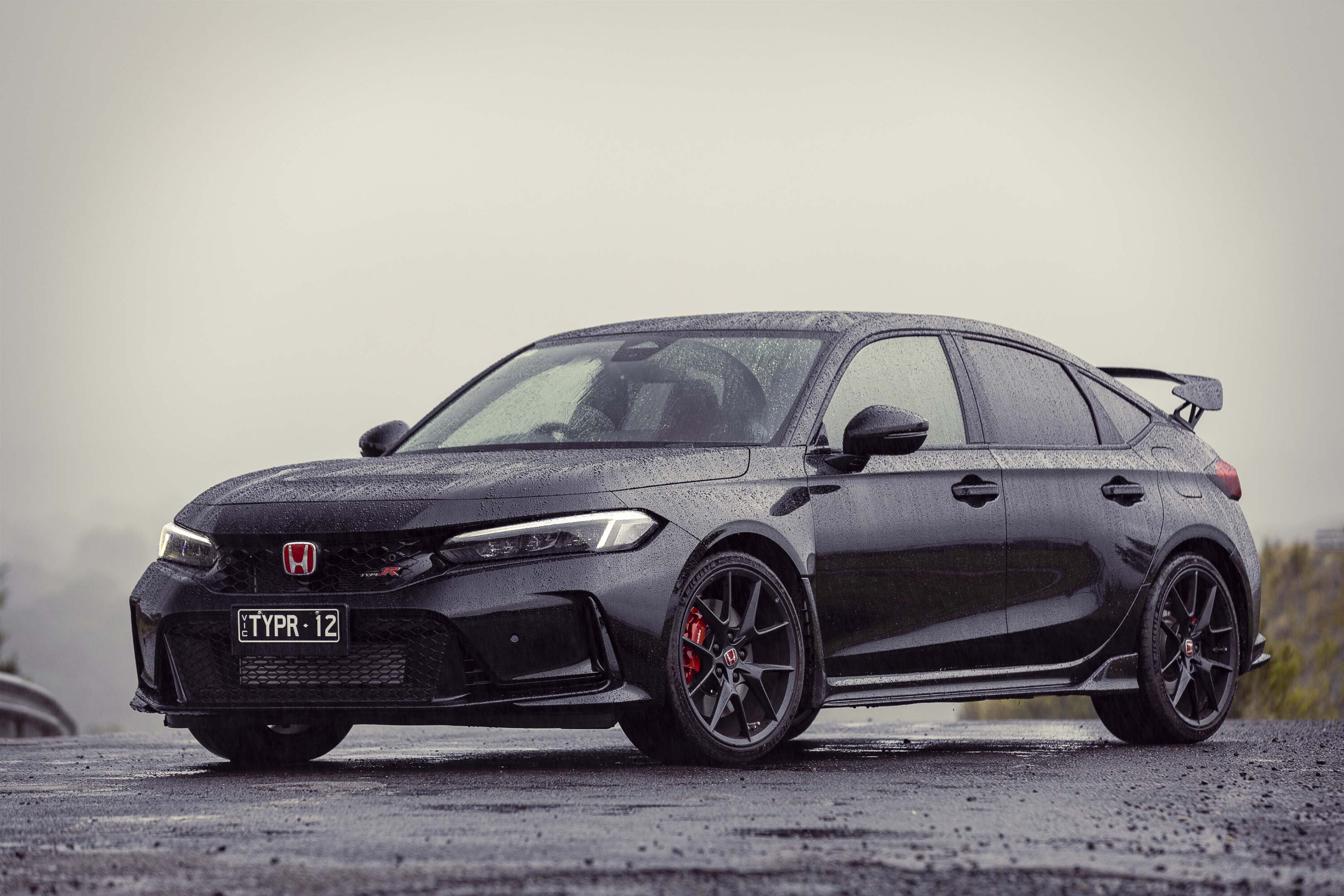
| 2023 Honda Civic Type R specifications | |
|---|---|
| Body | Five-door, four-seat hatch |
| Drive | Front-wheel drive |
| Engine | 2.0-litre 4cyl, DOHC, 16v, turbo |
| Compression | 9.8:1 |
| Bore/stroke | 86 x 85.9mm |
| Power | 235kW @ 6500rpm |
| Torque | 420Nm @ 2600-4000rpm |
| 0-100km/h | 5.4sec (claimed) |
| Transmission | 6-speed manual |
| Weight | 1429kg |
| Fuel consumption | 8.9L/100km (combined) |
| L/W/H | 4606/1890/1407mm |
| Wheelbase | 2735mm |
| Tyres | 265/35 R19 Michelin Pilot Sport 4S |
| Wheels | 19-inch forged alloy |
| Price | $72,600 (driveaway) |
Score breakdown
Things we like
- Truly brilliant to drive
- Trounces its rivals for polish, cohesion and driver involvement
- Sensational manual gear shift (“don’t say ‘rifle bolt action’, don’t say ‘rifle bolt action’…”)
- Superbly comfortable red bucket seats
Not so much
- Price hike means it’s now pretty expensive
- You can’t get one; wait times are two years
- Back seat lacks air vents, USB-ports and other equipment
We recommend
-
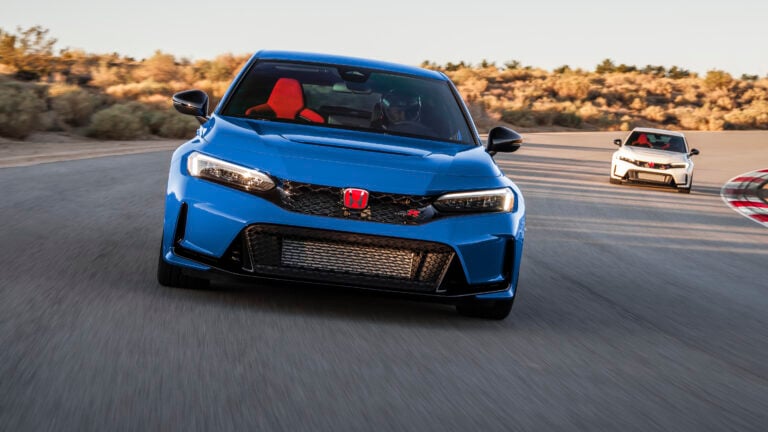 News
News2023 Honda Civic Type R Australian pricing and timing confirmed
Honda Australia confirms drive-away pricing, and the expected local arrival, for its hotly anticipated 2023 Civic Type R
-
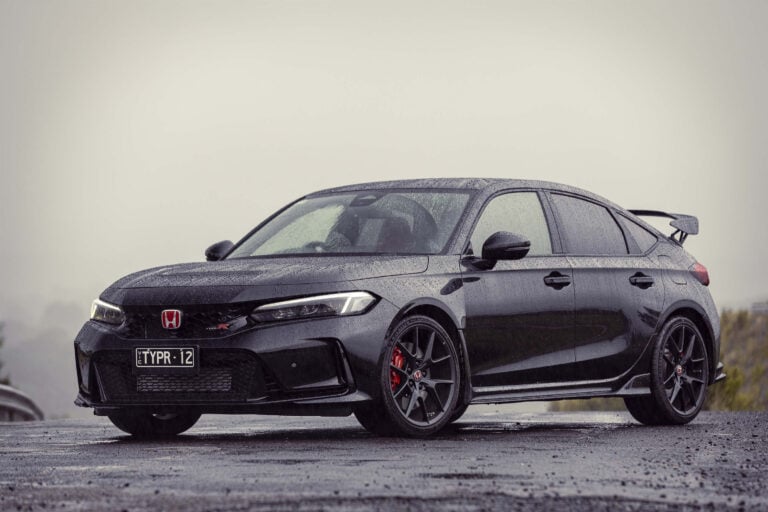 News
News2023 Honda Civic Type R wait times cut by ‘up to nine months’
Honda’s Aussie arm has managed to secure an extra 500 examples of the Civic Type R
-
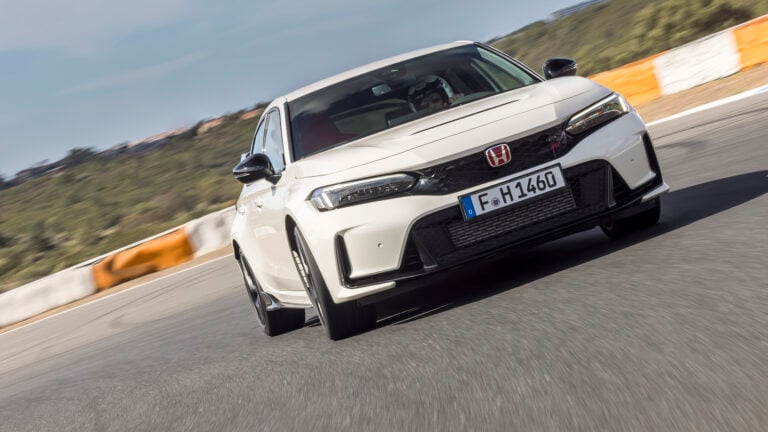 Reviews
Reviews2023 Honda Civic Type R review: New hero driven on road and track
Honda's new Civic Type R is better than its predecessor in just about every way, but is it worth the big asking price? Angus MacKenzie puts it to the test


